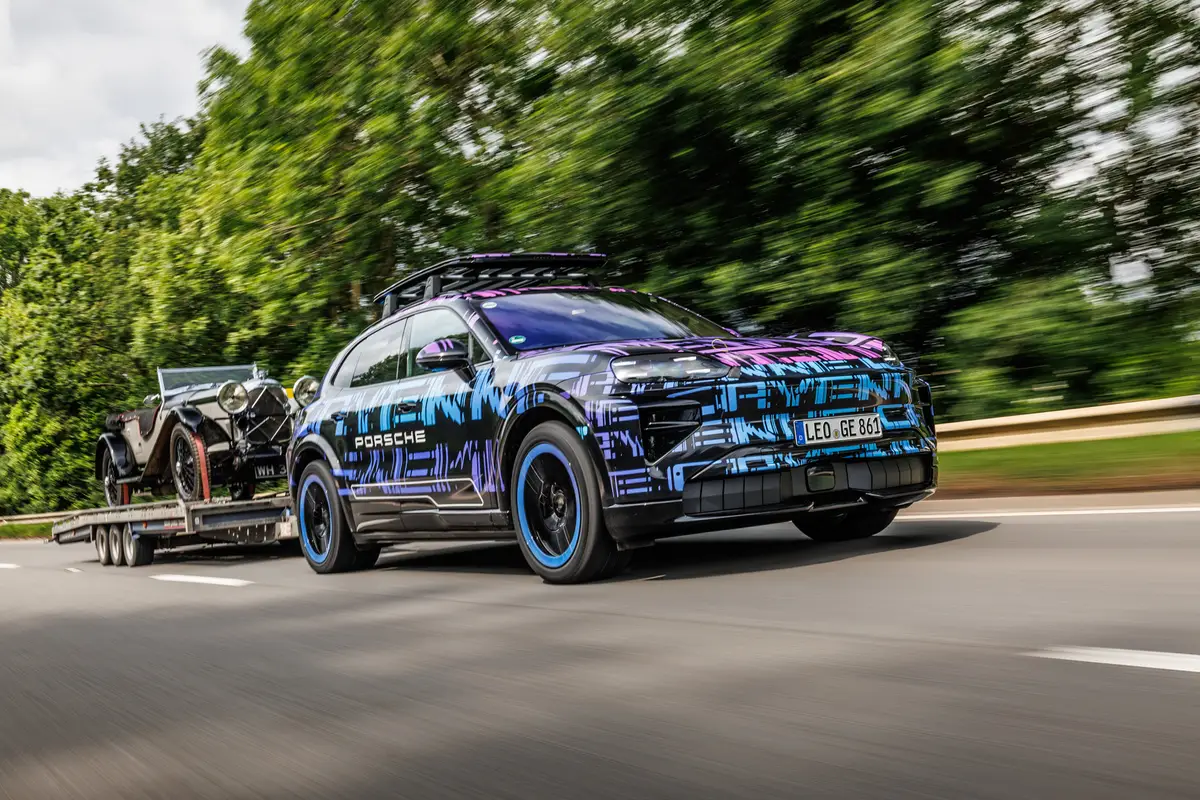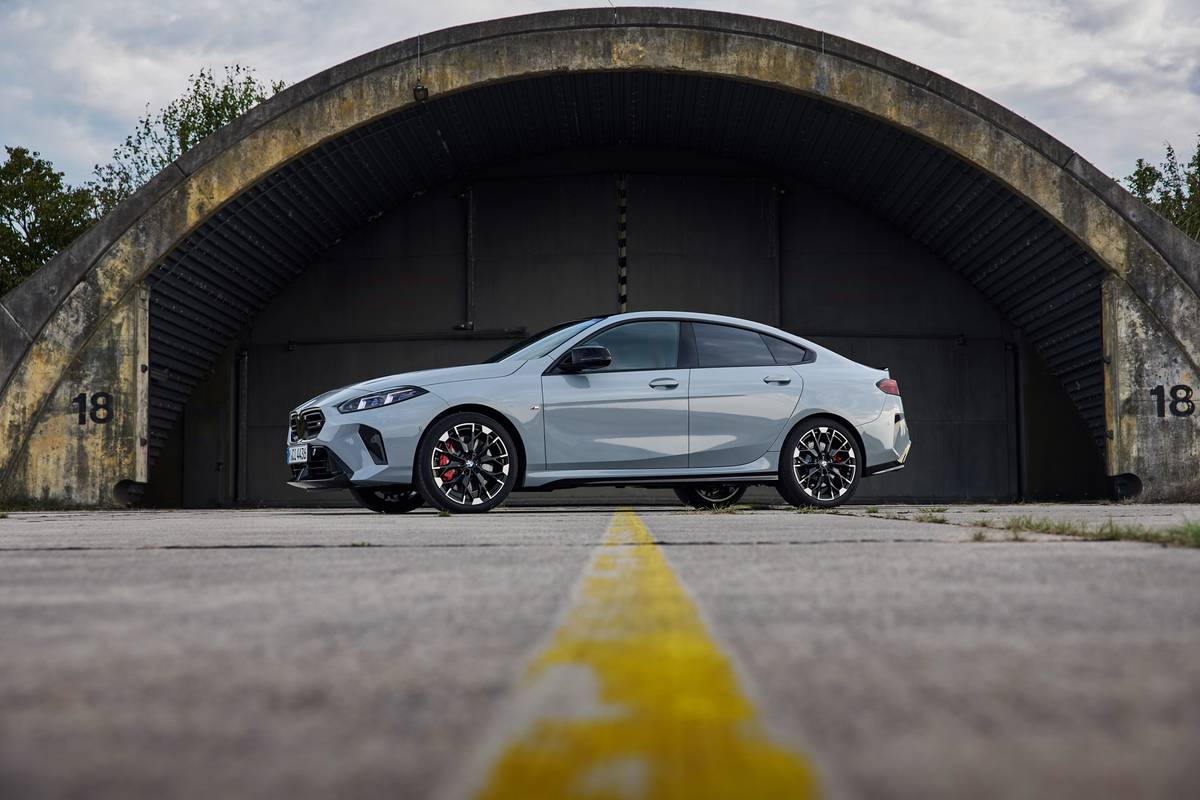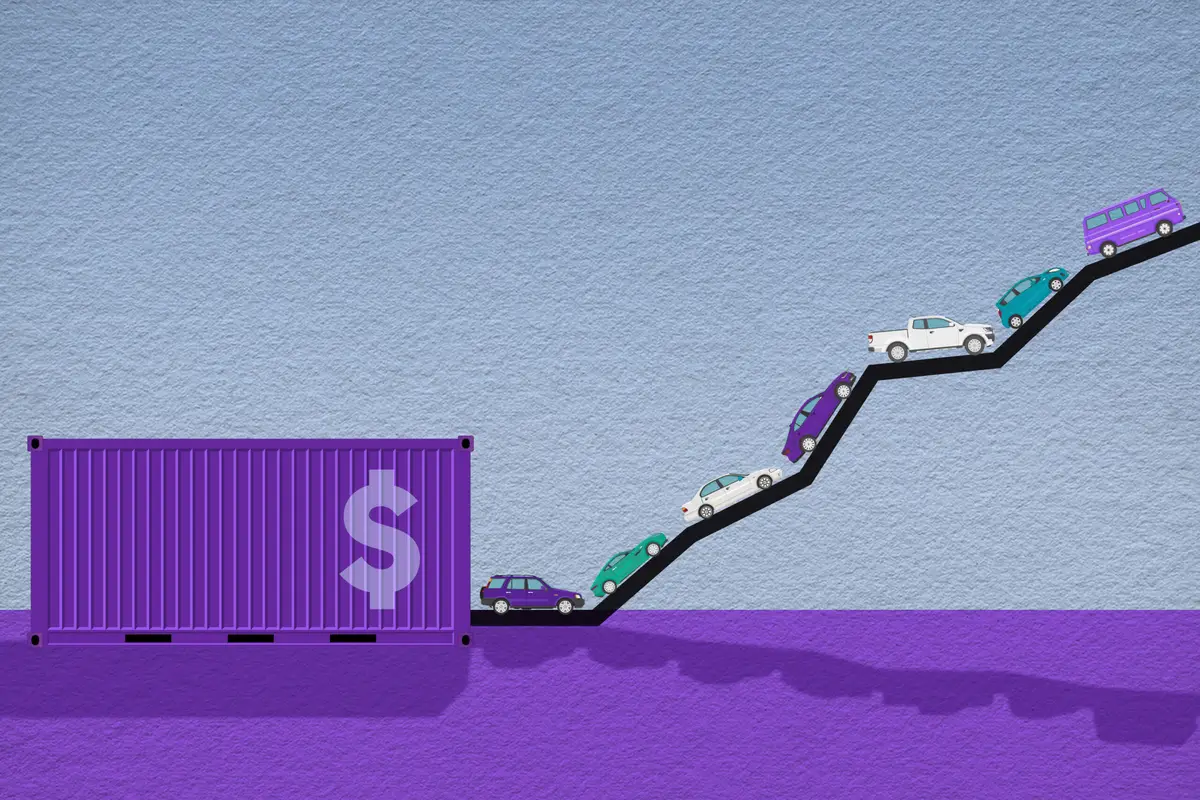2022 Toyota Tundra Review: Better Where It Counts

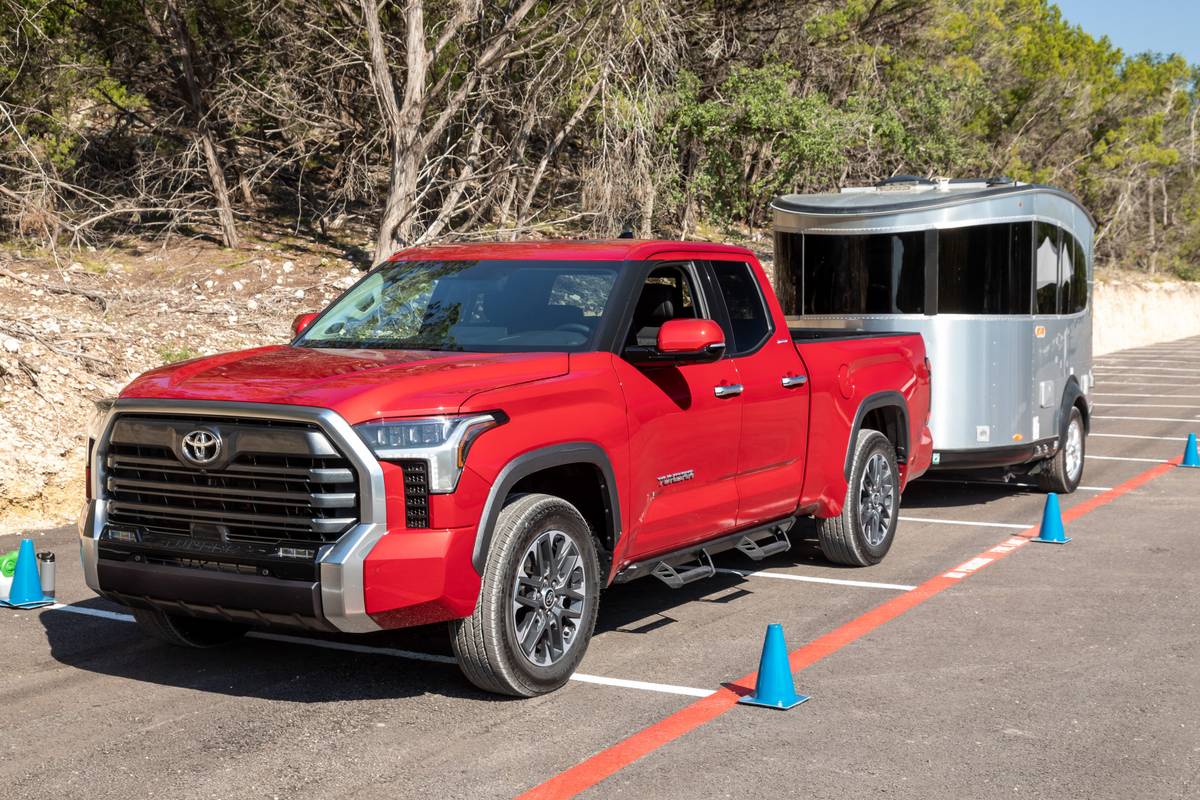
The verdict: Redesigned at long last, the 2022 Toyota Tundra pickup truck prioritizes improvements for the many over novelties for the few. The lack of the latter may limit its ceiling for success, but core half-ton shoppers should find plenty to like.
Versus the competition: The new Tundra doesn’t offer the sky-high payload or towing packages, advanced driver-assist tech or sumptuous interiors you’ll find in certain other trucks. But it does spread plentiful features and excellent powertrains across all trim levels.
Fully redesigned for the first time in 15 model years, the 2022 Tundra comes in two cabs, three bed lengths, two powertrains and rear- or four-wheel drive. Trim levels and suspensions number a half-dozen each. At Toyota’s press preview in San Antonio, I spent a jam-packed day evaluating six Tundra configurations (Cars.com pays its own airfare and lodging at such automaker-sponsored events).
Related: Up Close With the 2022 Toyota Tundra Limited
I’ll refer often to specific configurations, so here’s a cheat sheet up front:
- Trim levels: In ascending order, trims are the SR, SR5, Limited, Platinum, 1794 Edition and TRD Pro. In January 2022, Toyota added an additional trim called the Capstone. Read more on it here.
- Cabs and beds: The Tundra’s extended cab, called Double Cab, has four forward-hinged doors and 6.5- or 8.1-foot beds. The crew cab, called CrewMax, comes with 5.5- or 6.5-foot beds, the latter a first for the CrewMax. A regular (single) cab remains unavailable, as no Tundra has offered it since 2017.
- Drivetrains: Gas-only or hybrid V-6 powertrains, both turbocharged, pair with a 10-speed automatic transmission and rear- or four-wheel drive. The hybrid comes only on the CrewMax.
- Suspensions: Passive shock absorbers with coil springs all around are standard. Rear air springs are optional, as are rear air springs with four-corner adaptive shocks. (You can’t get the adaptive shocks with rear coil springs.) Finally, three packages from Toyota Racing Development — the racier TRD Sport, trail-oriented TRD Off-Road and rock-crawling TRD Pro — build off the passive shocks and coil springs. The TRD Pro is its own trim level, while the TRD Sport and TRD Off-Road are optional packages available on select other trims.
Toyota officials said the gas-only Tundra goes on sale in December, with the hybrid coming in spring 2022.
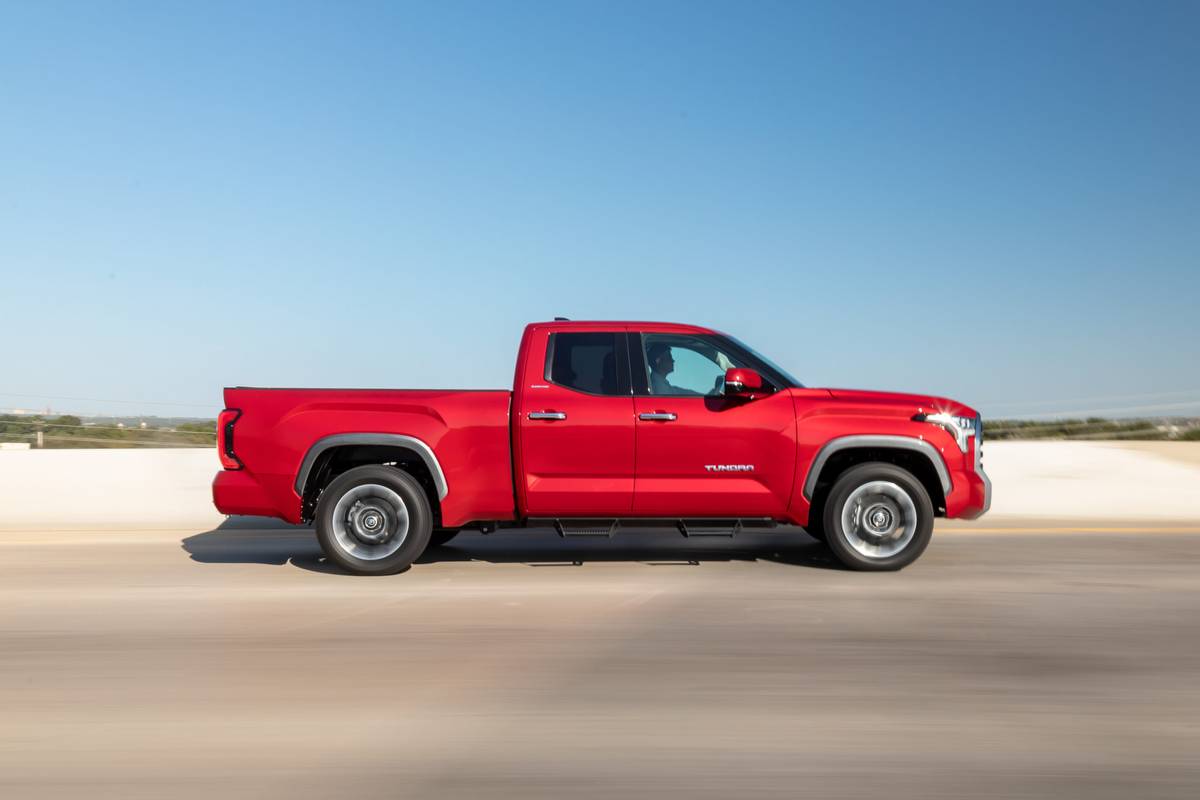
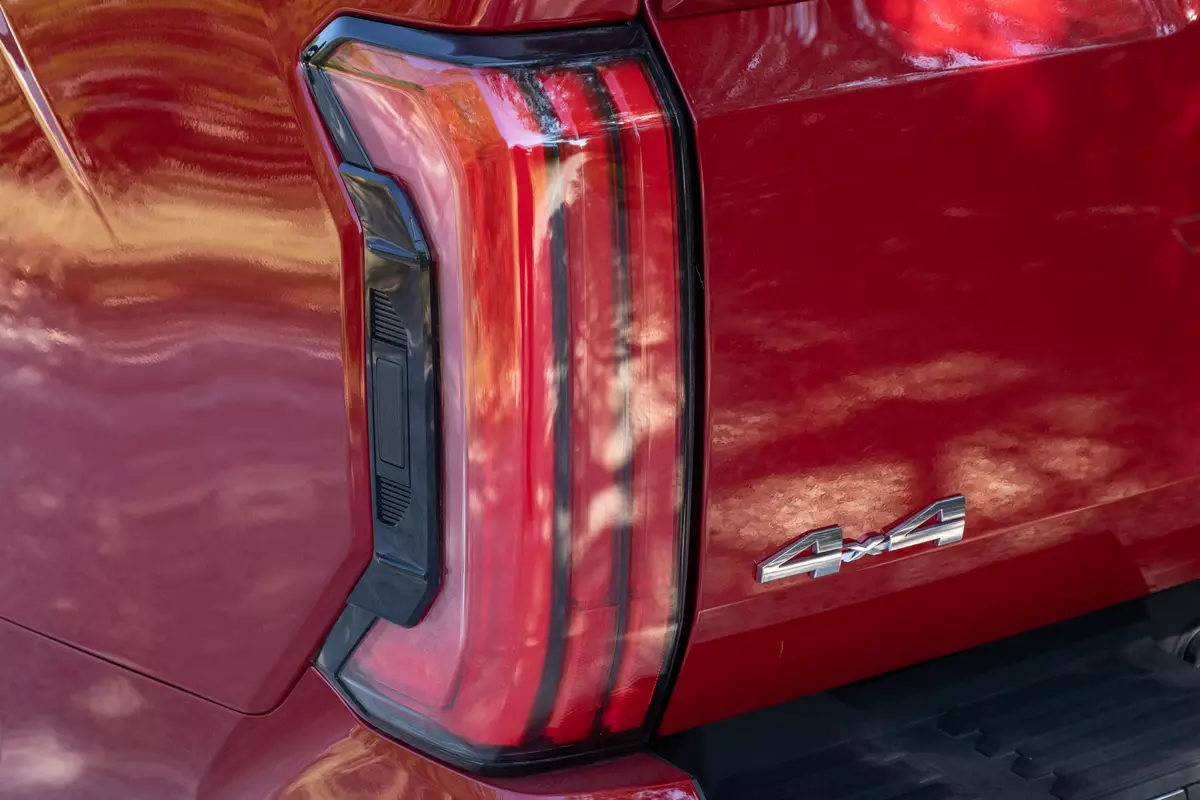
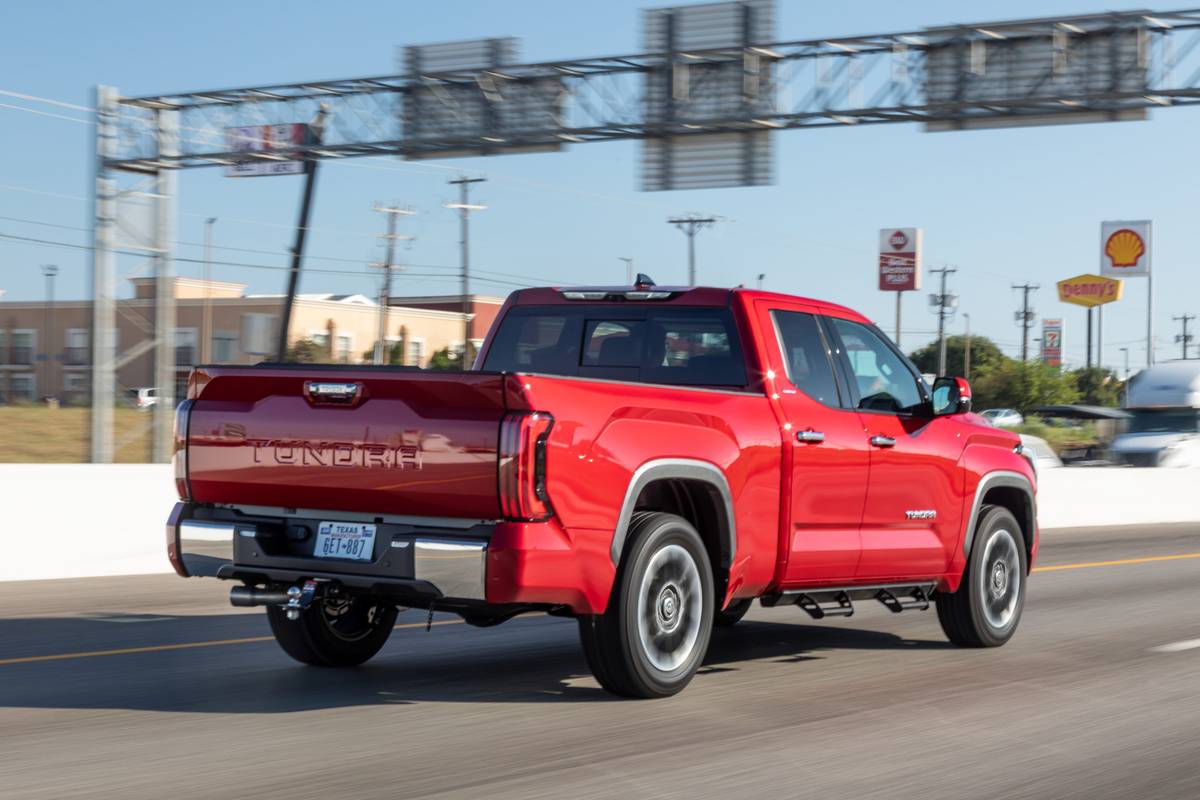
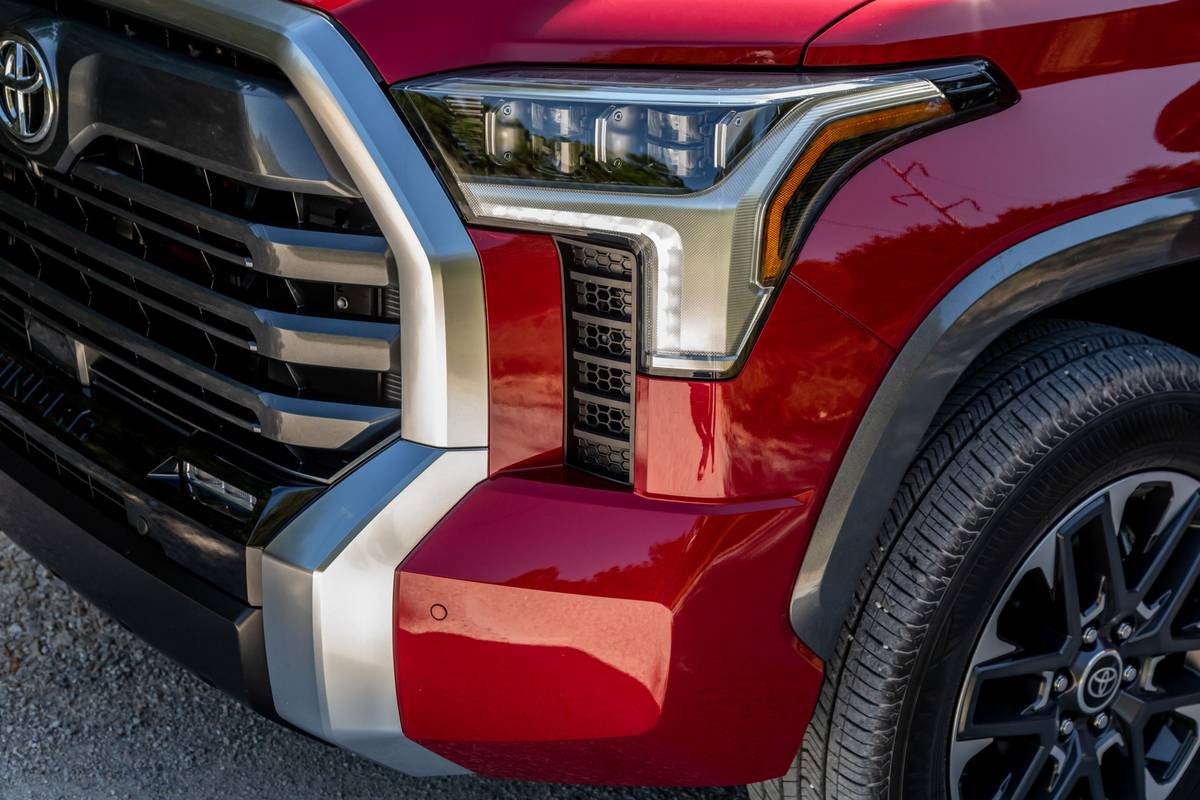
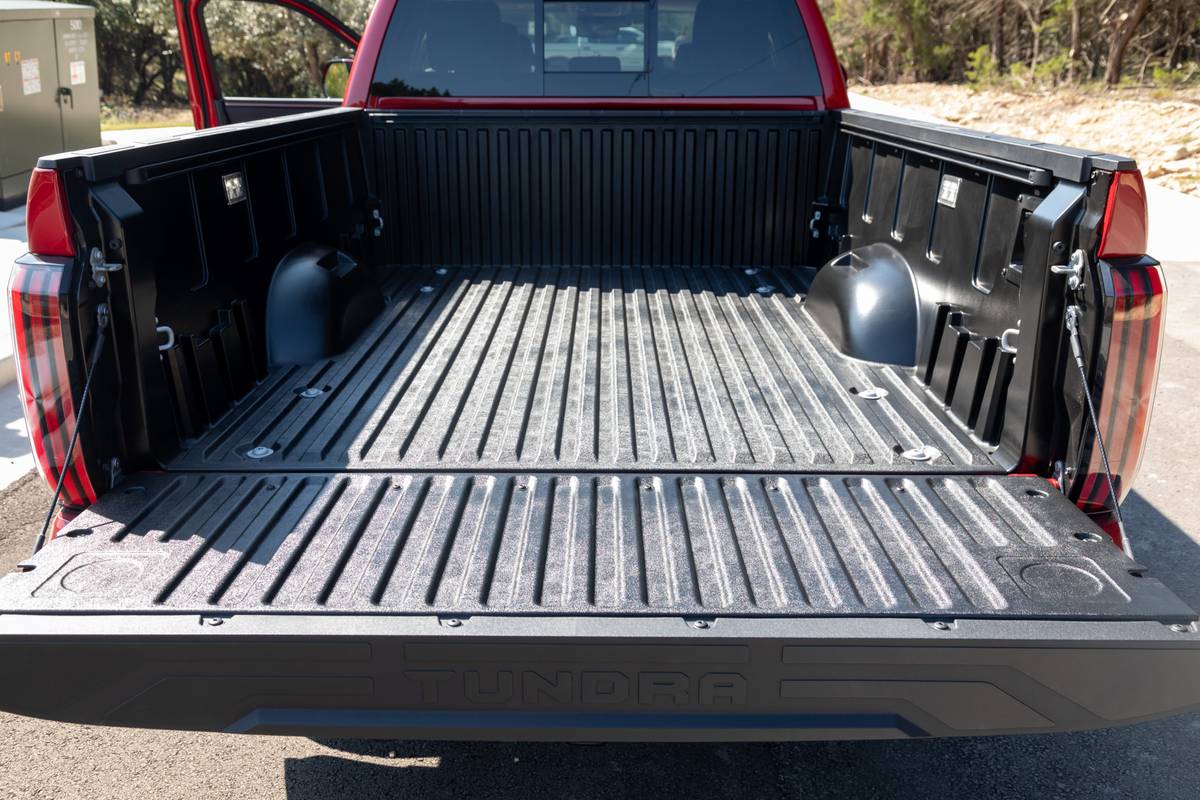
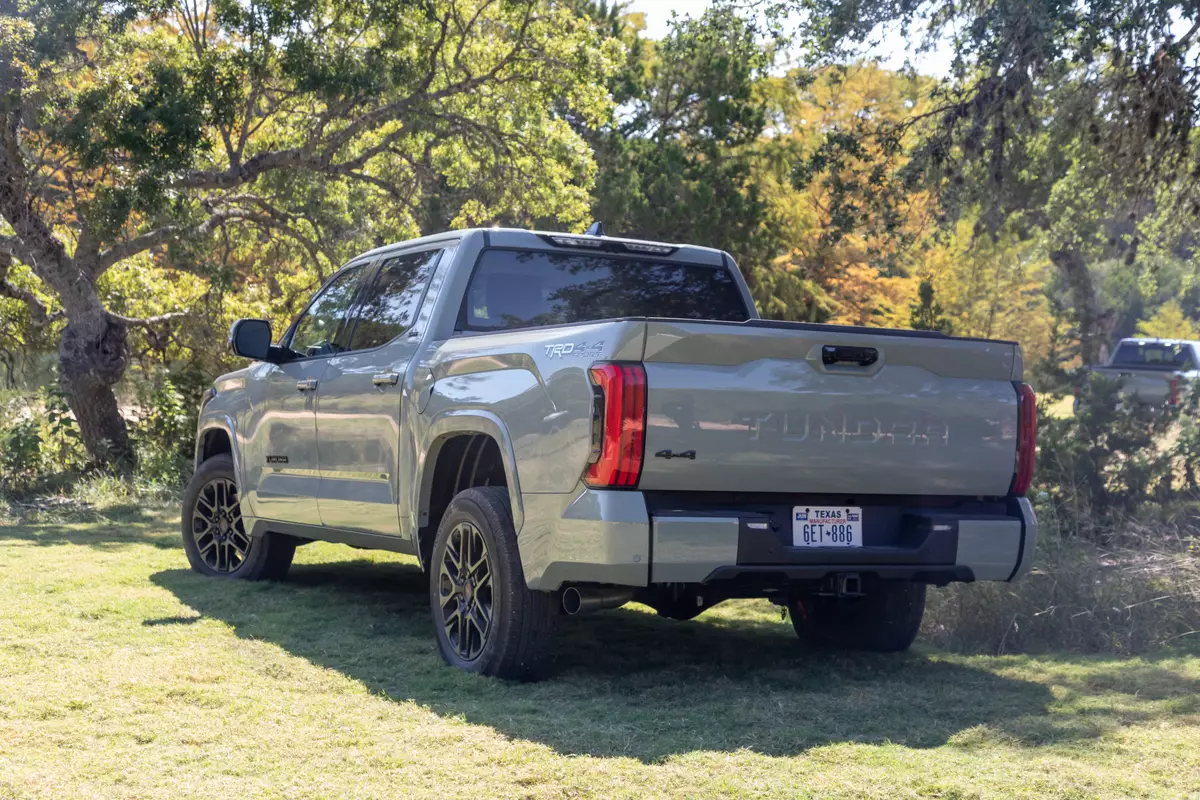
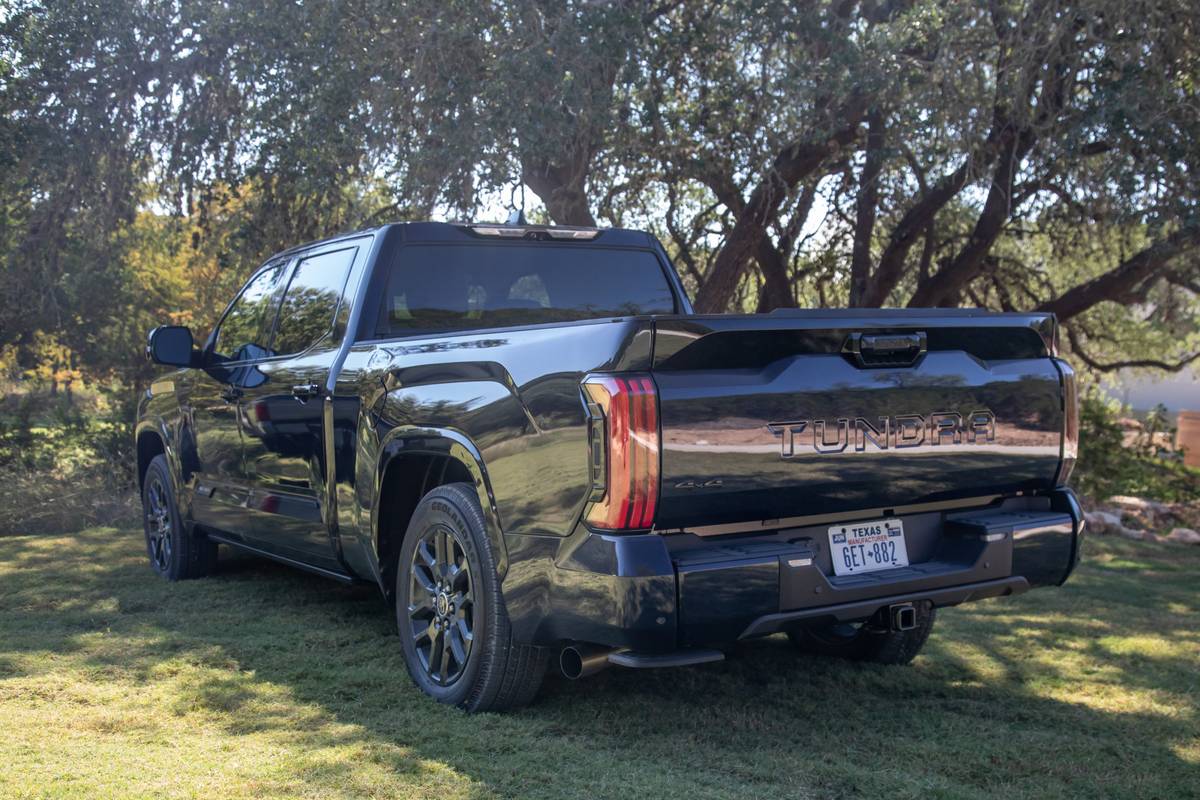
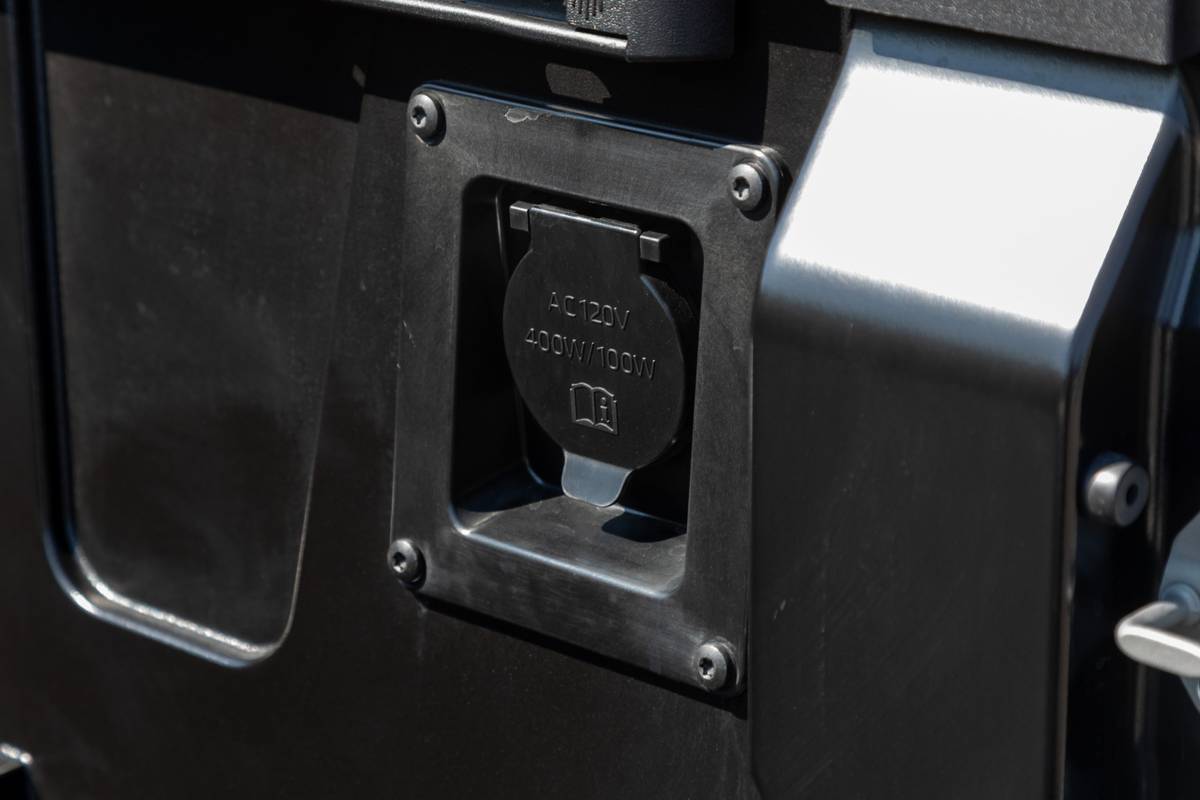
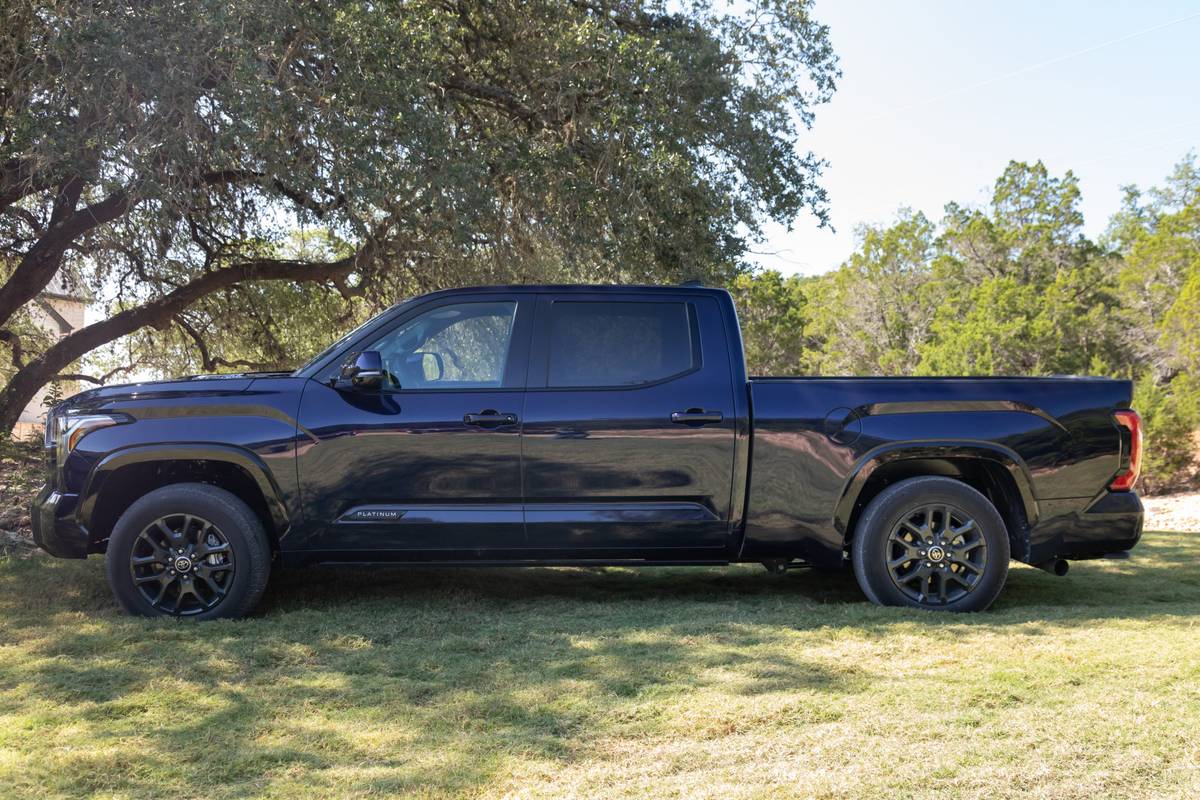
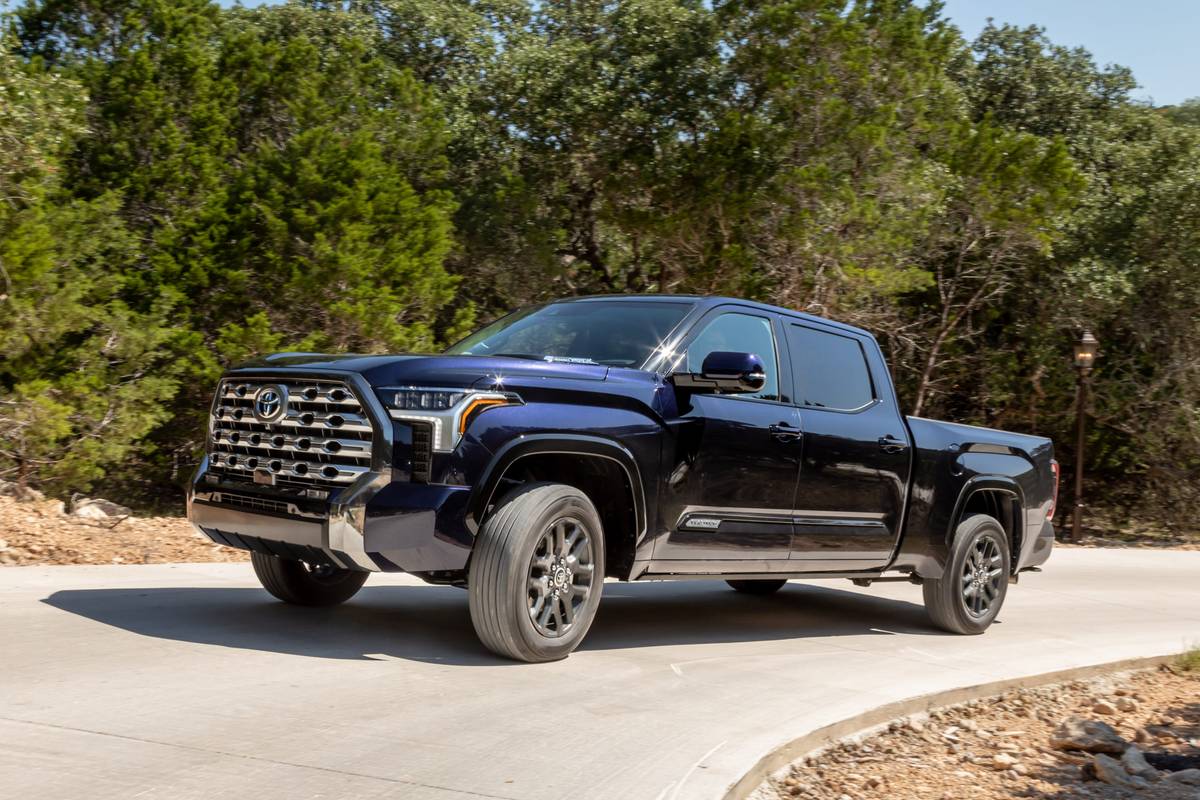
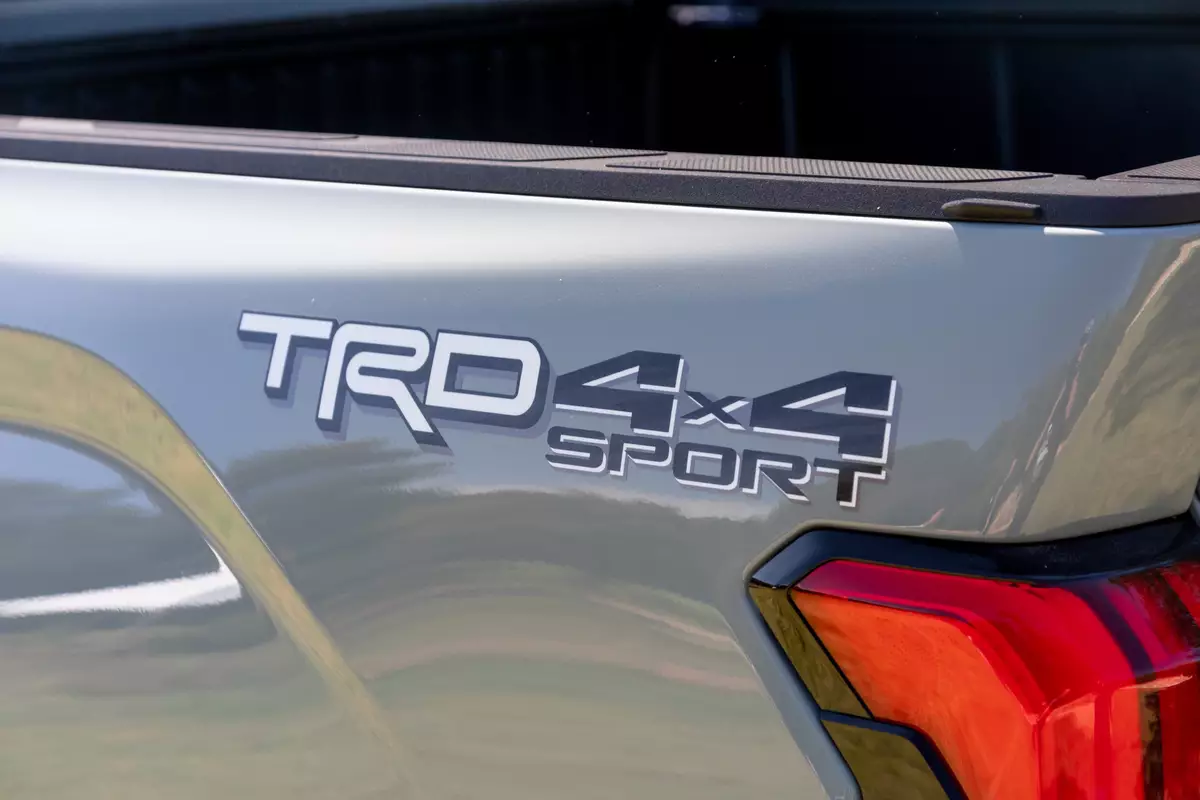
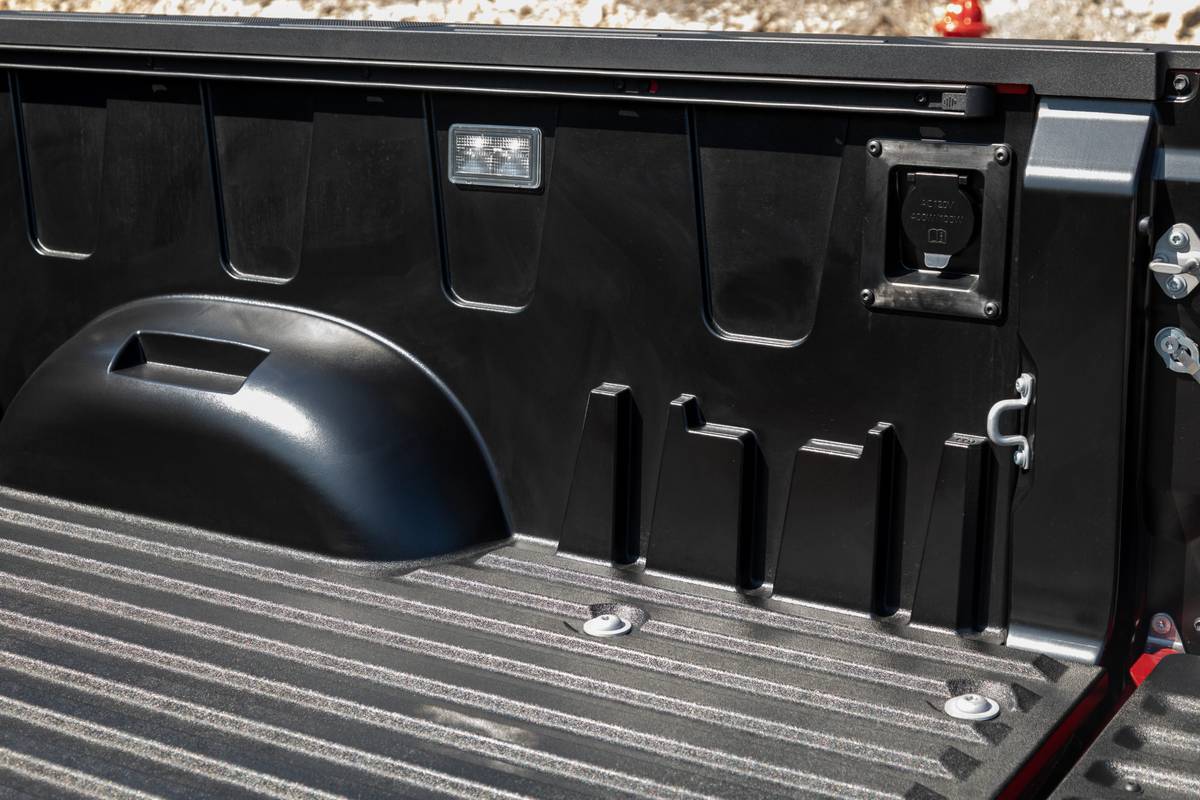












About (That) Face
I seldom dwell on vehicle design, but the Tundra’s hood-engulfing grille deserves discussion — or, more specifically, its framework does. Hung in contrasting color above a black lower bumper on most configurations, the frame looks like a squashed arch that runs into a black abyss. The abyss — sorry, bumper — forms a chin so prominent it seems single-handedly responsible for the 2022 Tundra’s roughly 5 inches of additional length. (Indeed, those gains are all from overhang; the wheelbase for most versions is unchanged.) It’s worth noting that mammoth grilles haven’t stopped recent Toyota models from selling like gangbusters; you can’t say the automaker played it safe.
Engines and Transmissions
Gone is the Tundra’s longstanding 5.7-liter V-8, replaced by a turbocharged 3.5-liter V-6. It’s distinct from the turbocharged V-6 of similar displacement used in Toyota’s Lexus division, officials told me, and it makes 389 horsepower and 479 pounds-feet of torque. The SR grade has a detuned version that makes 348 hp and 405 pounds-feet of torque. Finally, the hybrid powertrain, which Toyota markets as i-Force Max, sandwiches an electric motor-generator and clutch into the bell housing between the engine and transmission, with combined output of 437 hp and 583 pounds-feet. The electric motor draws power from a nickel-metal-hydride battery under the rear seat, and officials said both powertrains make their advertised outputs on 87-octane gasoline.
You won’t miss the V-8. The turbocharged V-6 in the SR5 and up is as potent, pushing the Tundra to highway speeds in scant time, complete with whooshing turbochargers. (I didn’t drive the SR’s base powertrain.) Accelerator response from a stop is fairly lag-free, and engine rpm builds quickly thereafter. This is as formidable as the Ford F-150’s turbocharged 3.5-liter V-6 or the Ram 1500’s 5.7-liter V-8, to name two solid rival powertrains. And Toyota expects 20 mpg in EPA-combined fuel economy for the gas-only rear-drive Tundra. That’s competitive with similarly powered pickups, should the EPA corroborate.
If there’s any weak link, it’s the 10-speed automatic. A first for any Toyota-branded vehicle in the U.S., the 10-speed enables short gears and quick revving, but I detected a couple of clunky upshifts and consistent hesitation to downshift while already in motion. Light throttle brings single-gear kickdown without too much delay, but harder acceleration at highway speeds — shooting a gap in the passing lane to pass slower traffic, for example — incurs delays of 2 seconds or more in the driver-selectable Normal or Sport modes.
Toyota’s a repeat offender for kickdown lag, and so it goes here. The 3.5-liter feels strongest at mid-to-high rpm, but the 10-speed delays getting there for too long. I’ve clocked half the kickdown time from the Chevrolet Silverado 1500’s excellent 10-speed; Toyota’s unit needs work.
A brief drive in the Tundra hybrid showed more decisiveness from the 10-speed — kickdown comes a little sooner, though it remains slow overall — along with even more power, particularly off the line. Toyota claims the hybrid is capable of electric-only power propulsion at speeds up to 18 mph, but it’s hard to distinguish between electric and engine power. Most of the time they seem to be working together, a characteristic I’ve also observed in Cars.com’s long-term F-150 hybrid.
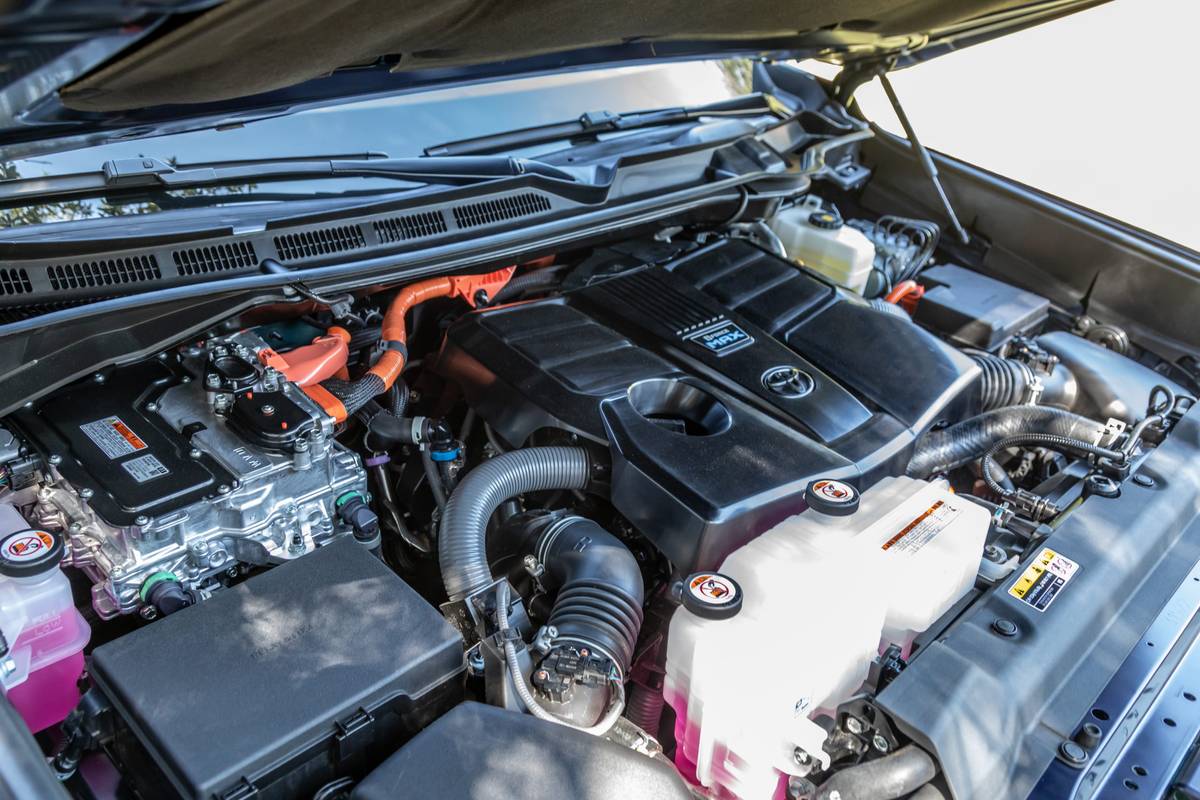
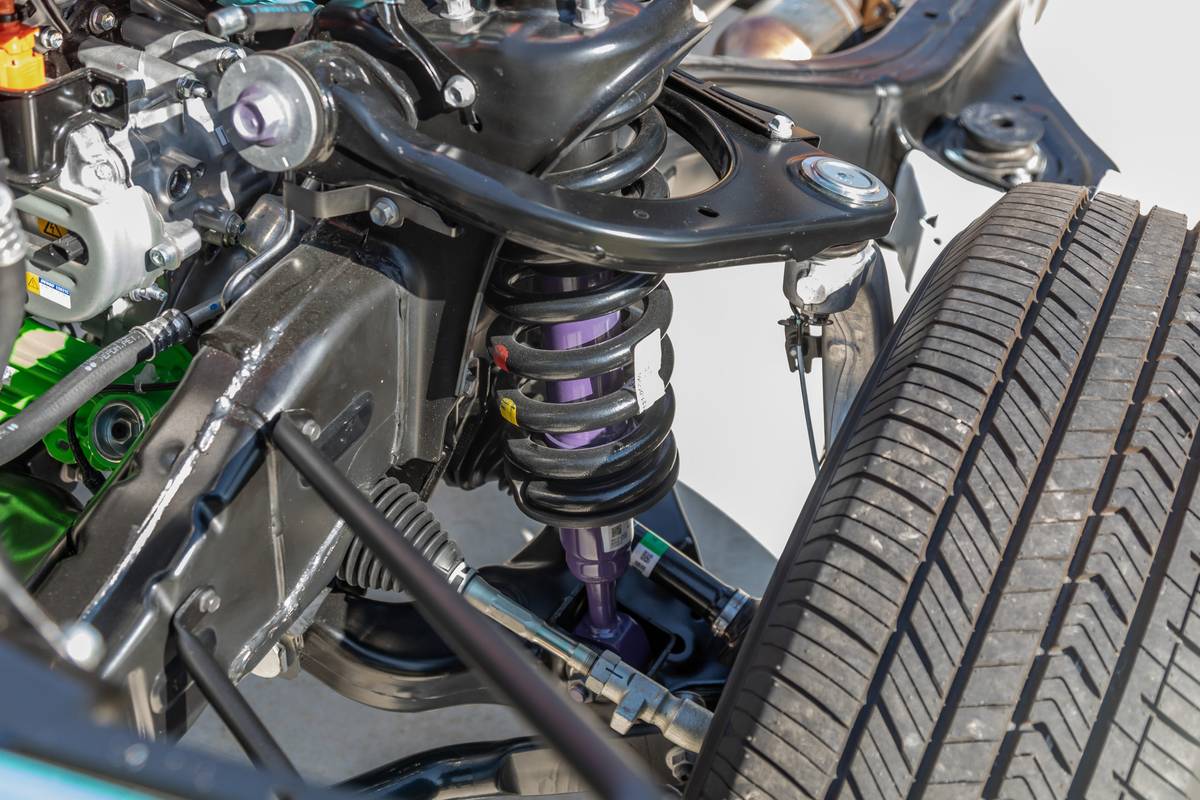
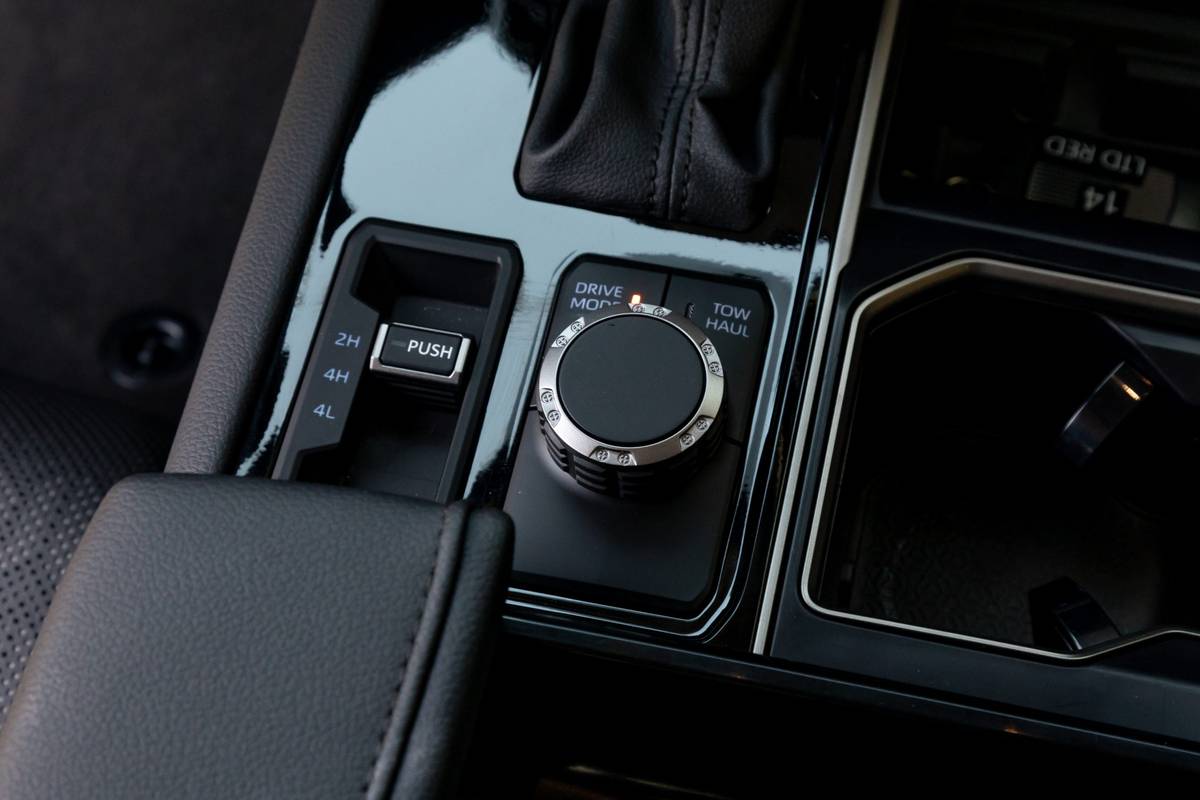
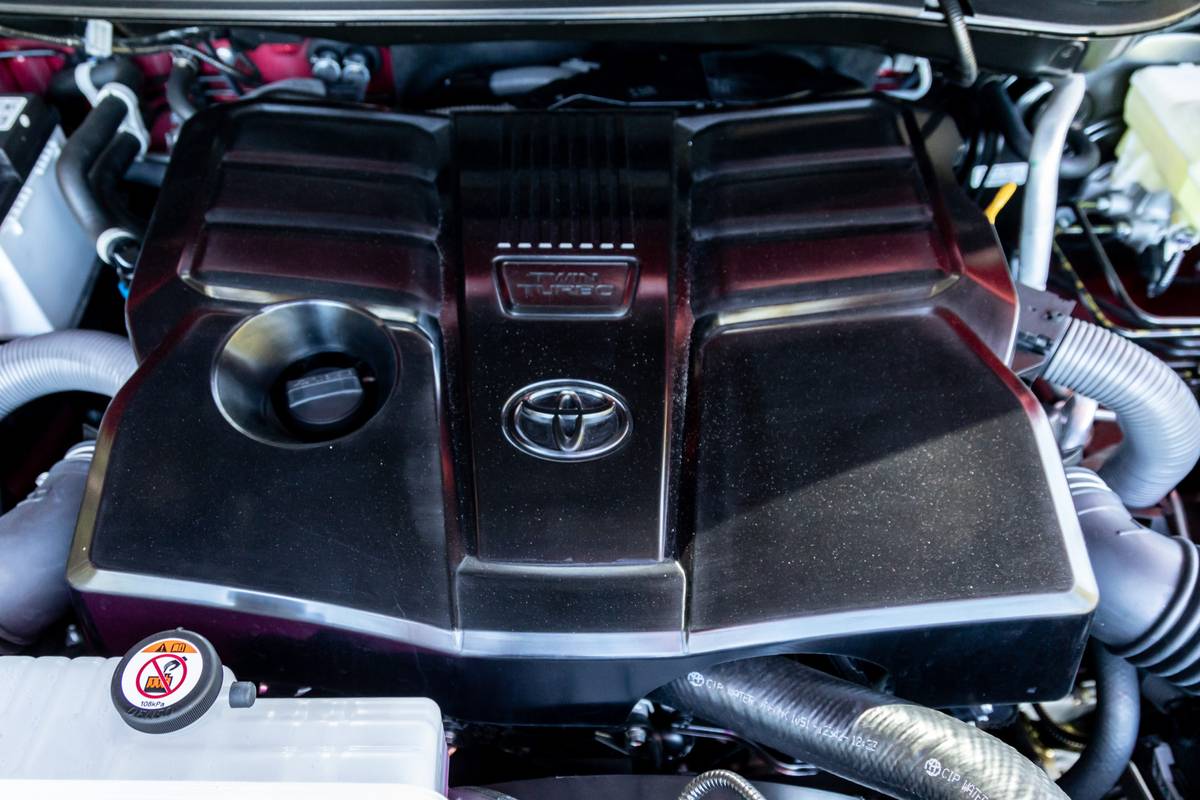
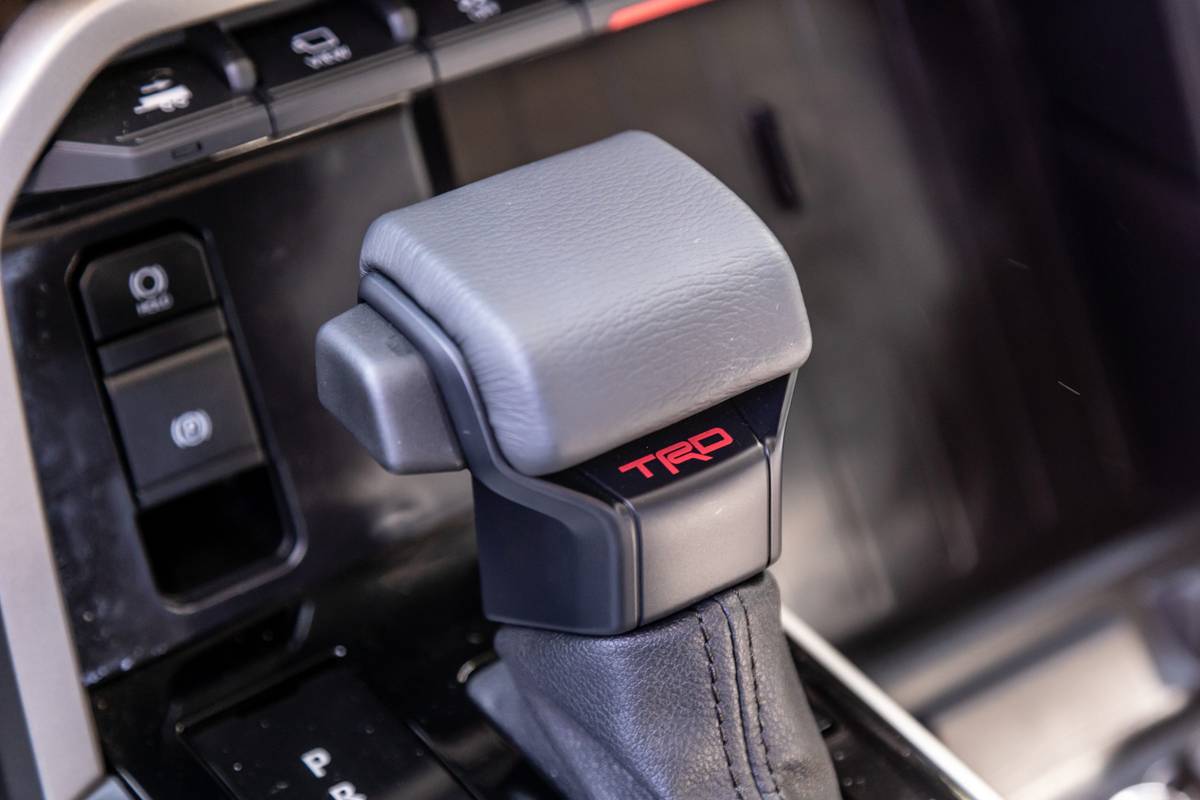
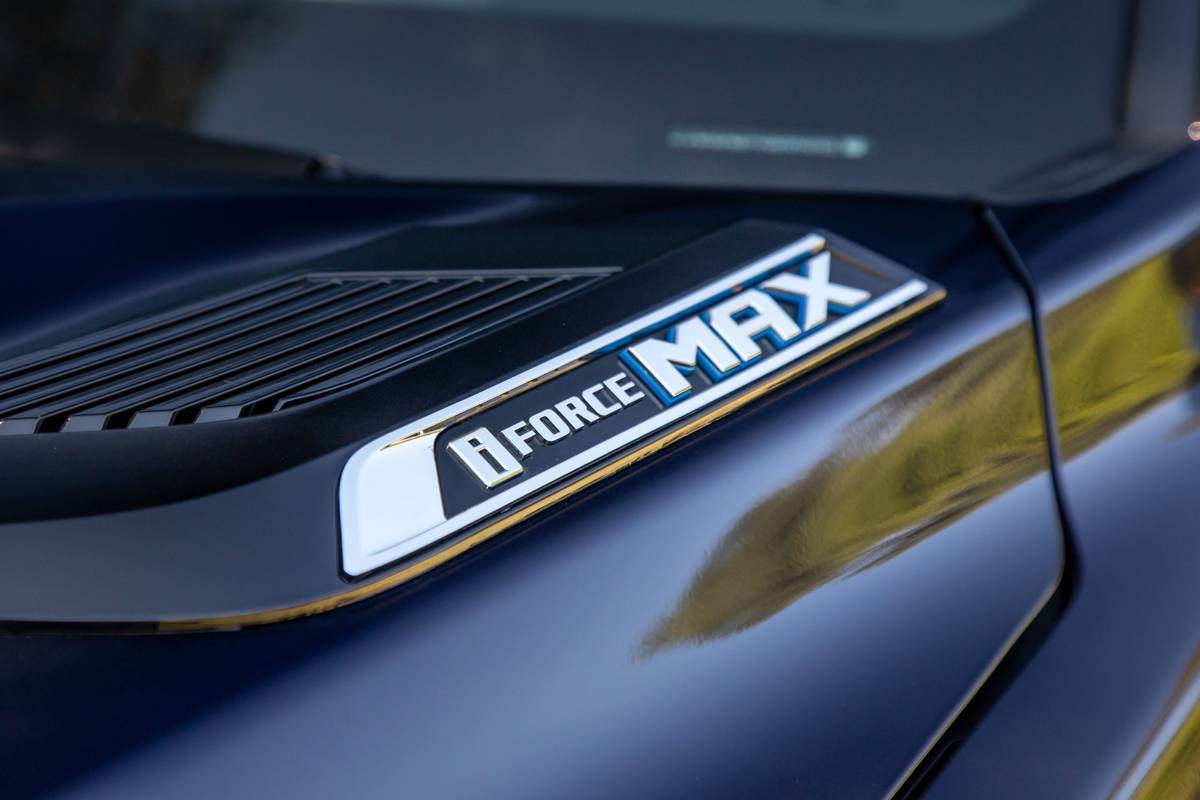
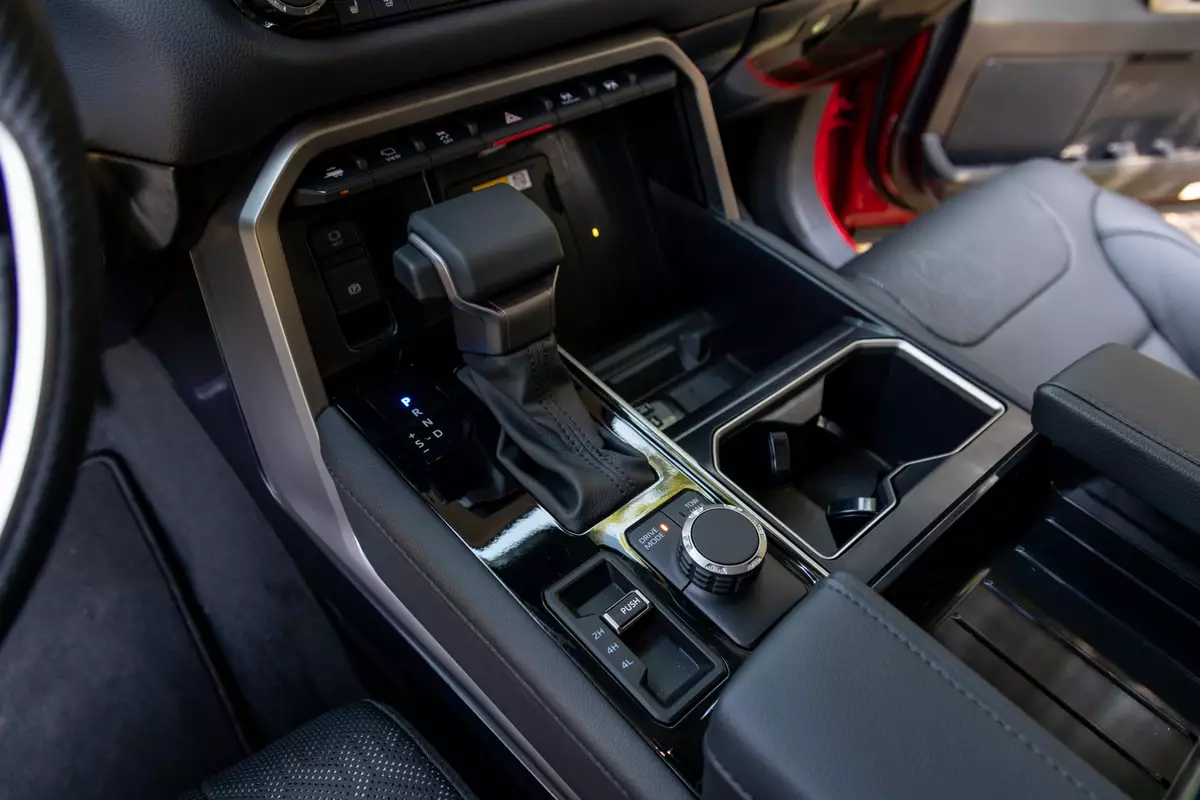
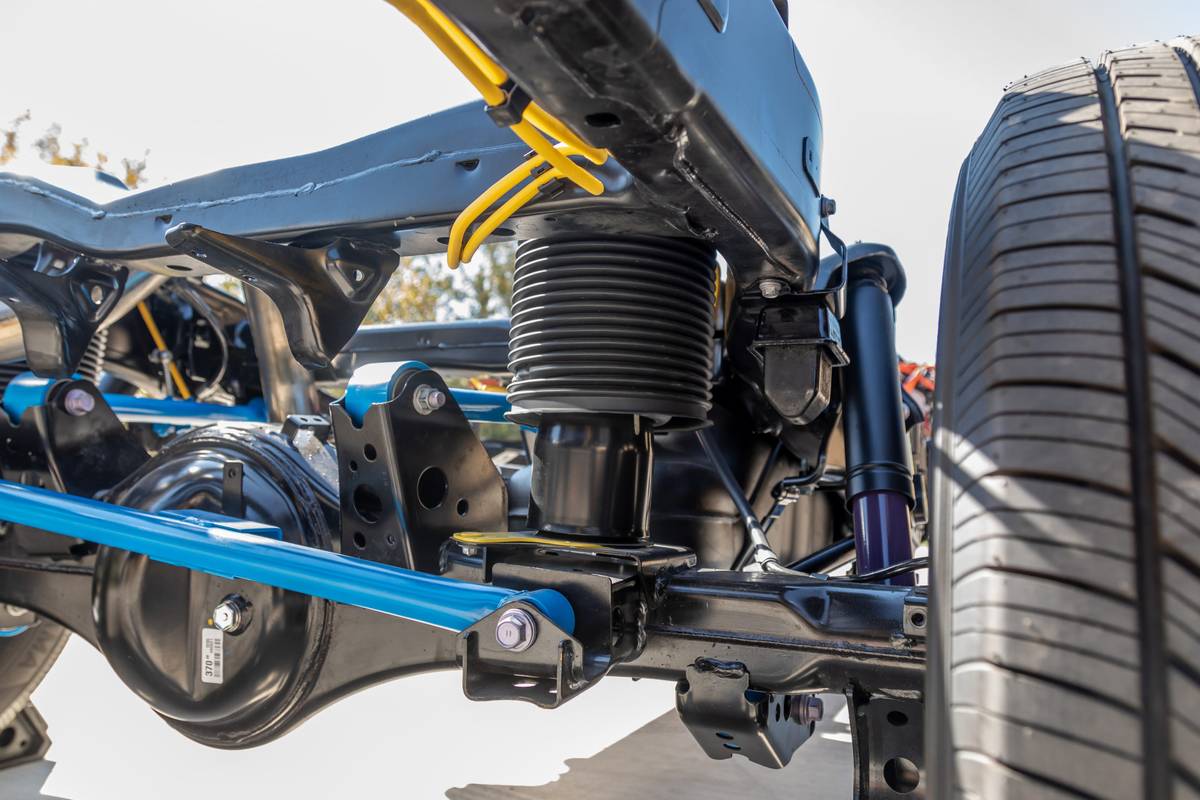








Ride and Handling
The new Tundra shares underpinnings with the redesigned Land Cruiser, an SUV slated for international markets but not here. That means a fully boxed frame instead of the outgoing Tundra’s rear C-channels, plus rear coil springs in place of leaf springs. Options include air springs in back and adaptive shocks all around, the latter a worthwhile upgrade for body control.
The air springs and passive shocks grant acceptable unloaded ride quality, with soft impacts but a degree of jittery reverb on par with most other body-on-frame pickups. (Adding payload can often improve how pickups ride, but I didn’t evaluate a Tundra thus outfitted.) The adaptive shocks clean up the jitters appreciably, though not completely, with a driver-selectable Comfort setting that mutes impact harshness further. At that, the Tundra approaches the very good ride quality in the light-duty Silverado and GMC Sierra in no small part because Toyota doesn’t pair the adaptive shocks with massive wheels and comfort-sapping, low-profile tires. Rims top out at a relatively modest 20 inches, with the accompanying tires a high-profile P265/60R20 spec; the Capstone trim added in January 2022 features 22-inch rims, but we haven’t tested them. Most trim levels, including every example I tested, have the 20s, though lower trims and select TRD models can come with 18s.
Available in the Tundra SR5, the TRD Sport Package has a sport-tuned version of the passive shocks and coil springs. I sampled one, and it’s not too hardcore — a touch more turbulent but still comfort-tuned, with steering too numb and slow-ratio to deserve much fun-to-drive billing. With 20-inch wheels, body-colored cladding and a half-inch lower ride height, it’s mostly an appearance package.
Off-Road
Available on several trim levels, the TRD Off-Road Package pairs 20-inch wheels (18s on the SR5) with Bilstein monotube shocks instead of the standard twin-tube dampers. It also gets skid plates, mud guards, a locking rear differential and, if you get one with 4WD, a terrain-selection controller that optimizes various drive settings for the conditions outside. The 4WD TRD Off-Road also gets Toyota’s Crawl Control, a system popularized on the Tacoma mid-size pickup that can manage throttle for a constant, selectable speed. (You can also get the TRD Off-Road without 4WD, where it amounts mostly to an appearance package.)
On a wooded off-road course, a 4WD Limited model with the TRD Off-Road Package and Falken Wildpeak all-terrain tires managed the hilly terrain with little drama. Crawl Control bogged down a few seconds if I dropped an axle into something deep, then applied dogged throttle to get moving again. It did so without palpable wheel slippage at any corner even over some uphill rock facings without the rear locking differential engaged. With the lock engaged, the Tundra crawled off-kilter over half-buried logs with minimal wheel spin.
Want more? The TRD Pro gets 2.5-inch Fox internal-bypass shocks (the Bilsteins are 1.8 inches, by contrast), a 1.1-inch front suspension lift and a 20% stiffer front stabilizer bar. It also gets unique underbody protection for the engine, fuel tank and transfer case. Built off the Tundra Limited, the TRD Pro has 18-inch wheels with 33-inch, P285/65R18 Falken Wildpeaks — the widest of any Tundra tire. Approach and departure angles are 26.2 and 24.2 degrees, respectively, on the TRD Pro, up from 21 and 24 degrees for other trims. Note, however, that those approach angles are shallower and result from the increased overhang mentioned above: In 2021, lower-level Tundras had a 26-degree approach angle, though the departure angle was only 16 or 17, trim depending. Only the 2021 TRD Pro had a generous 31-degree approach angle and 17-degree departure angle.
More From Cars.com:
- Redesigned 2022 Toyota Tundra Gets New Powertrains, Tech and Capabilities
- Tacoma Vs. Tundra: Stacking Up Toyota’s Pickup Trucks
- 2021 Toyota Highlander XSE and Special 4Runner, Tacoma, Tundra Distinguish Themselves
- Research Toyota Models
- Shop for a Toyota Tundra
Towing and Payload Capacities
Towing and payload capacities improve over the outgoing Tundra, but they can’t touch the maximum packages offered elsewhere. Payload maxes out at 1,940 pounds for the 2022 model, up from the outgoing generation’s 1,730 pounds but well short of the Silverado 1500 (2,280 pounds), Ram 1500 (2,300) or F-150 (a bonkers 3,325).
A trend among redesigned pickups is a gaggle of bed innovations ranging from useful to gimmicky. Toyota didn’t throw much at the wall, at least from the factory. The new Tundra features no onboard generator, multifolding tailgate or in-bed trunk, though a purported 51 new or redesigned accessories (plus 64 carryovers) might have a surprise or three. Higher trim levels have a nifty release button tucked into the taillights, which you can elbow to drop the tailgate if your arms are full. (See, there’s something!)
More important is the Tundra’s newly standard, aluminum-reinforced composite bed material, which might save some shoppers the expense of adding a separate bedliner. Toyota says the material resists dents and corrosion better than steel or aluminum; indeed, its gritty, spray-in feel seems moderately durable. Regardless, shoppers with serious hauling needs may want to get a liner atop this, as the material doesn’t extend up the sides.
Maximum towing capacity for the 2022 Tundra increases to 12,000 pounds under SAE International’s J2807 standards. That’s a healthy gain over the prior generation’s 10,200 pounds but short of the Detroit Three competition (12,750 to 14,000 pounds, depending on truck). Available towing aids for 2022 range from rear-facing trailer lights on the optional tow mirrors to Straight Path Assist, a system that can automatically steer the Tundra while backing up to keep your trailer in a straight path; it’s similar to the F-150’s Pro Trailer Backup Assist. I sampled SPA with a short trailer hitched astern, and it mitigates the dreaded jacknife to back up straight, provided you line the trailer up beforehand in the intended direction. Adjusting your heading is possible, but expect a learning curve.
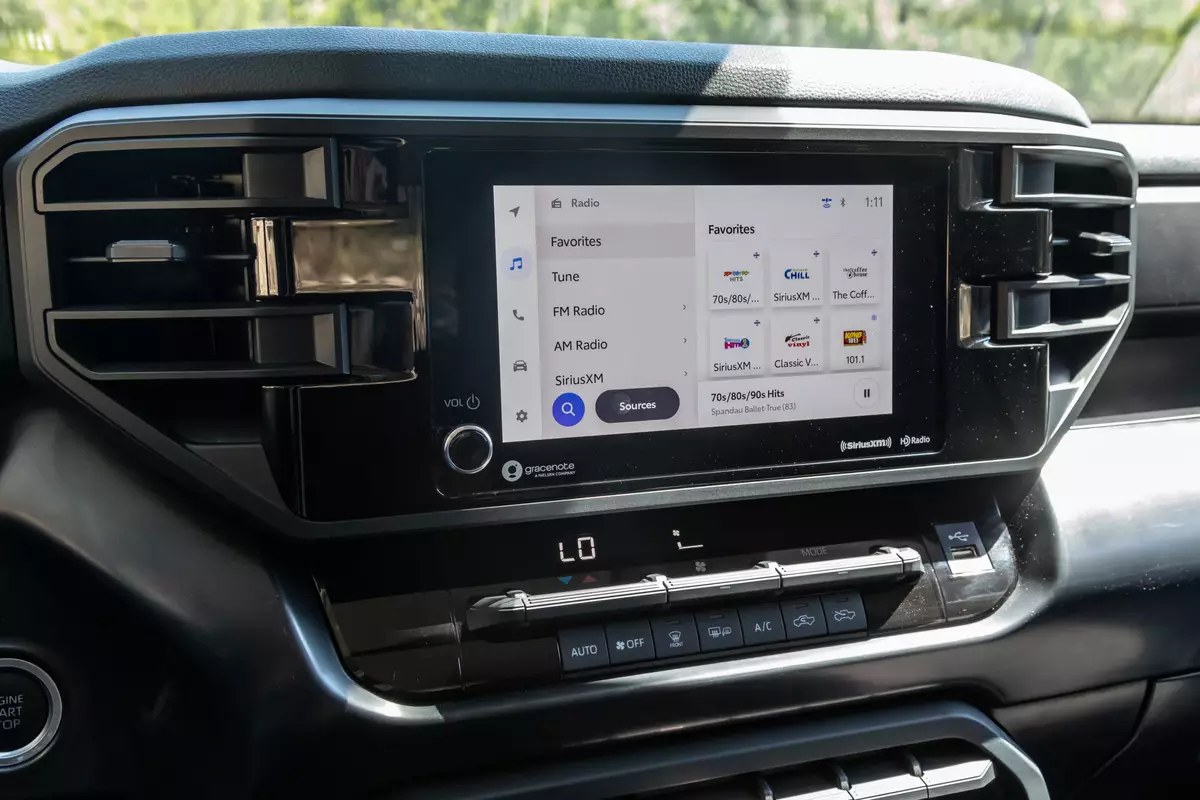
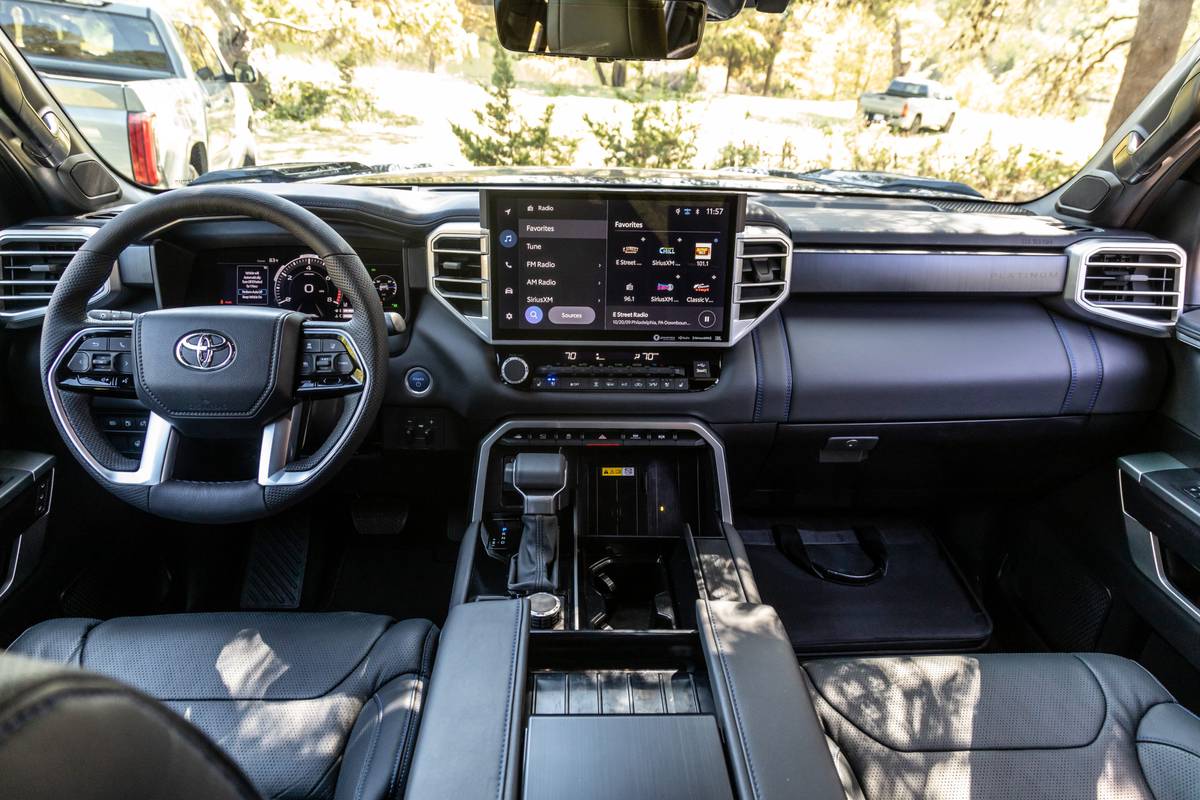
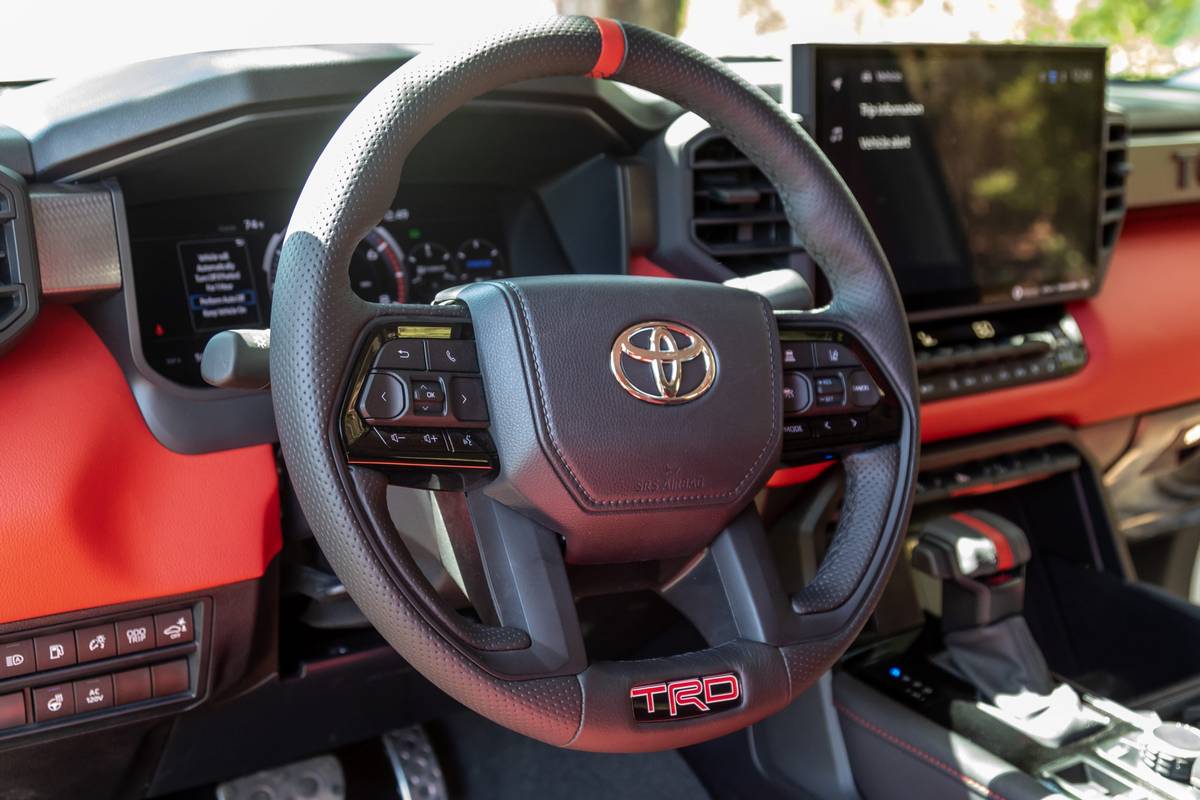
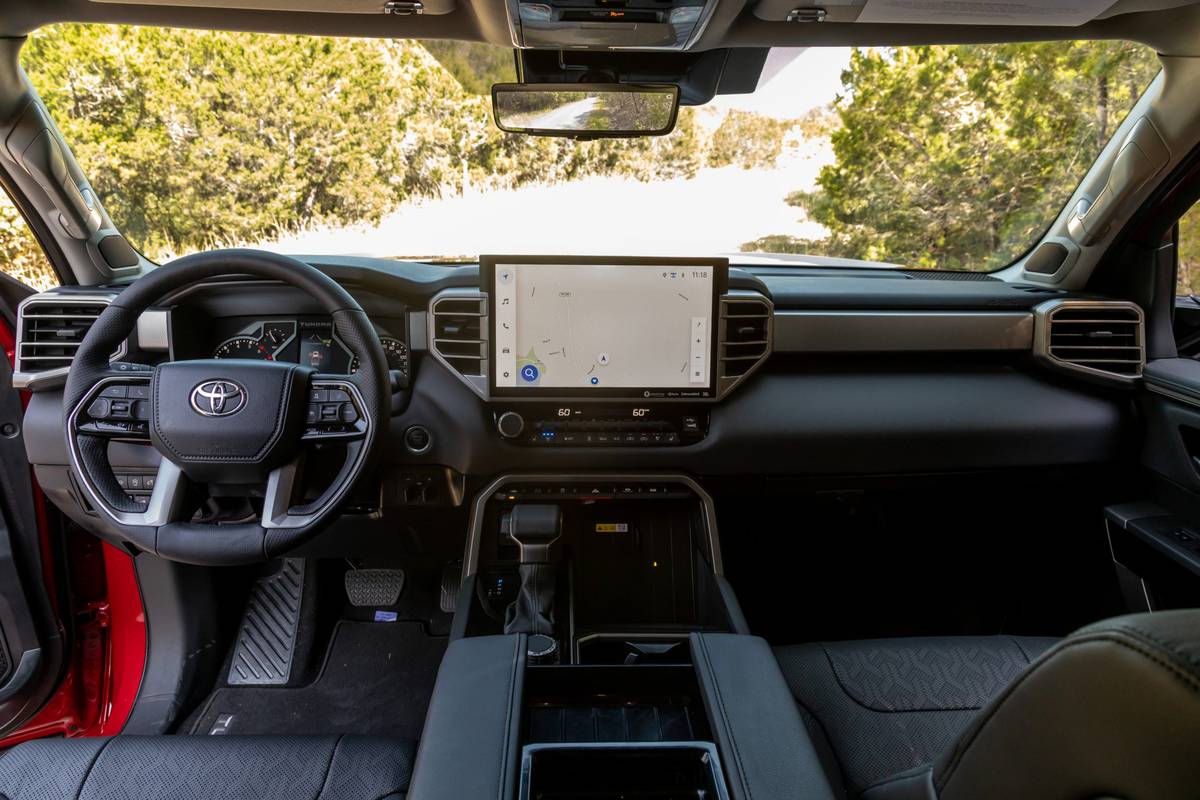
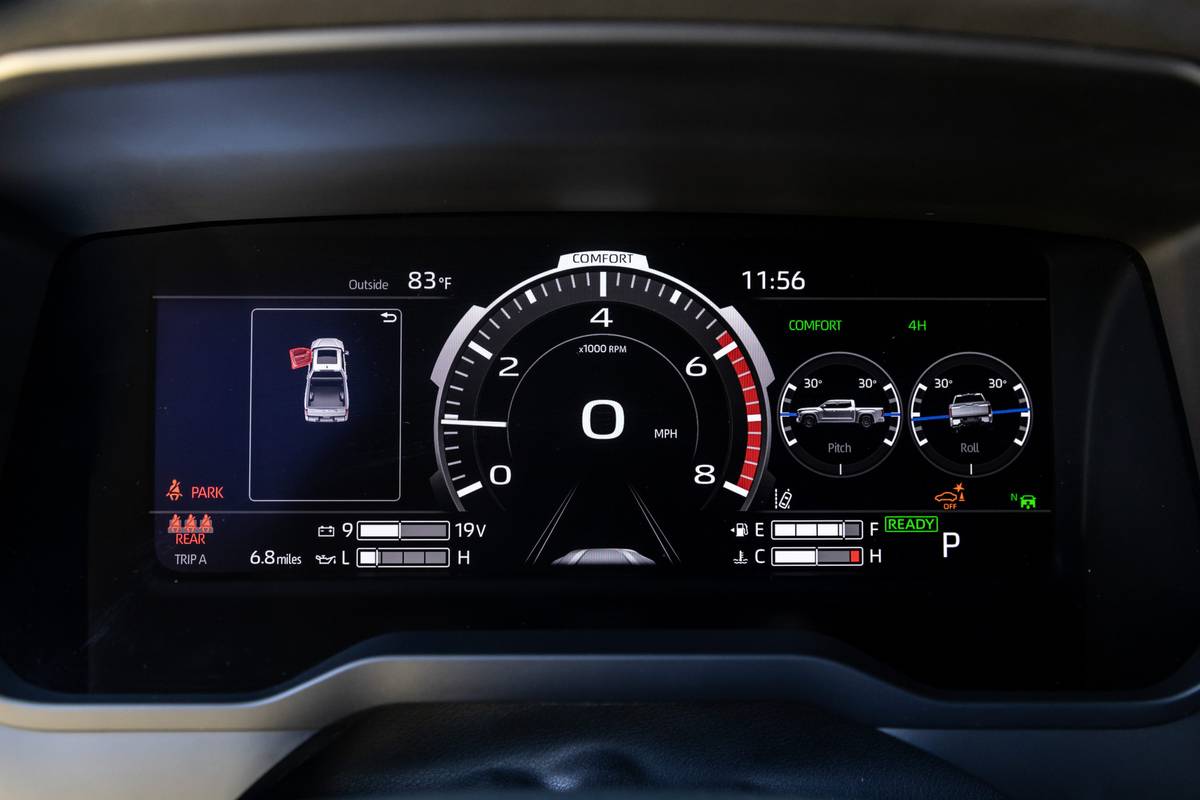
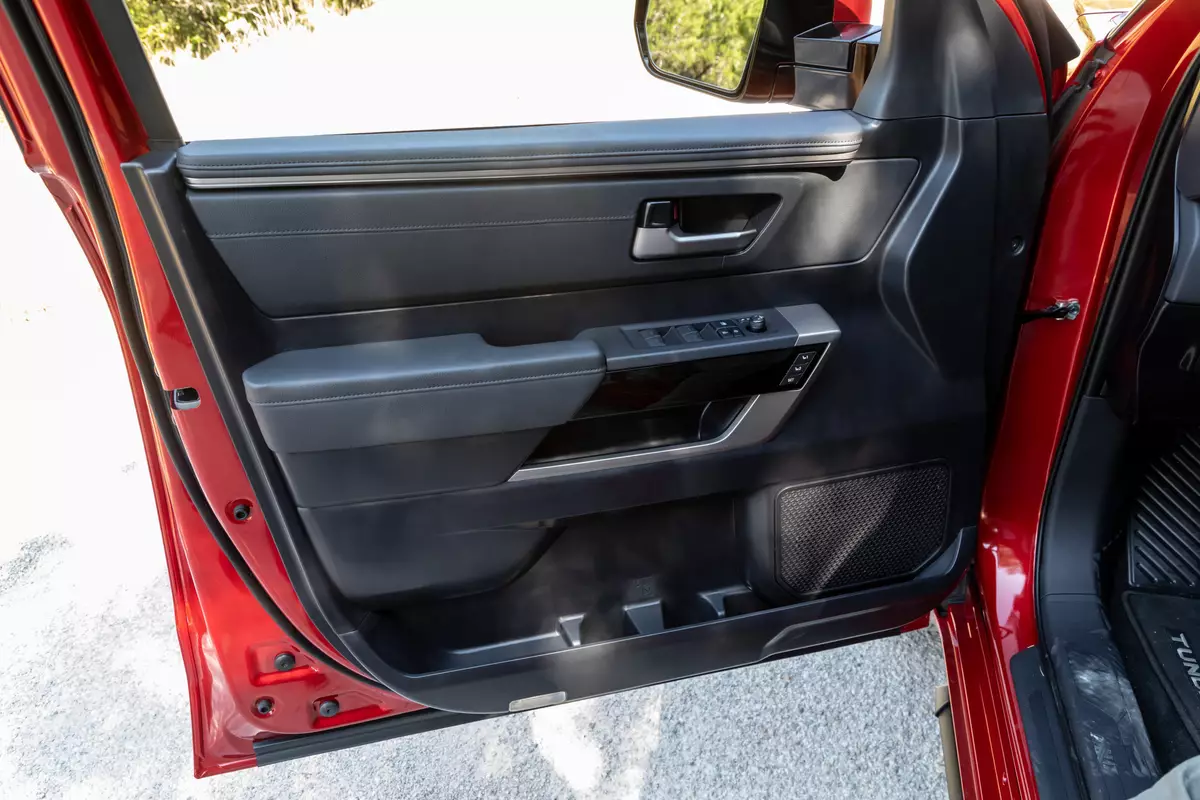
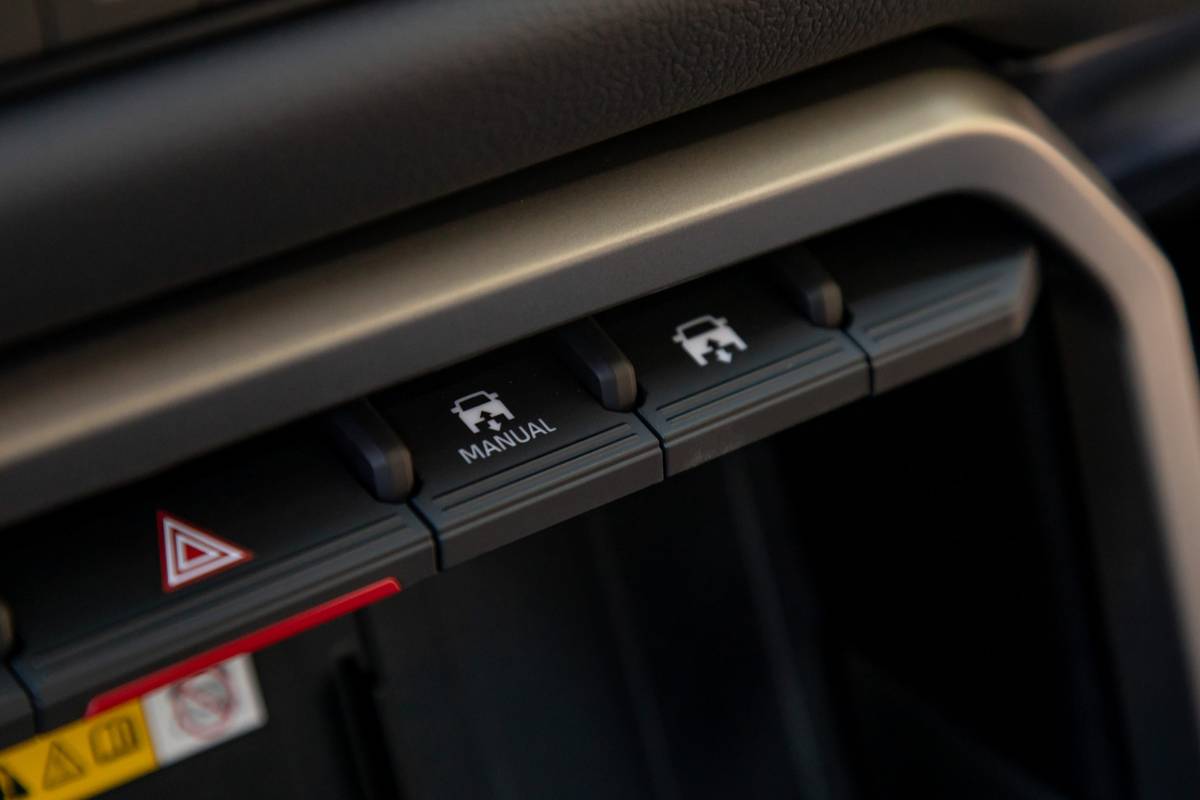
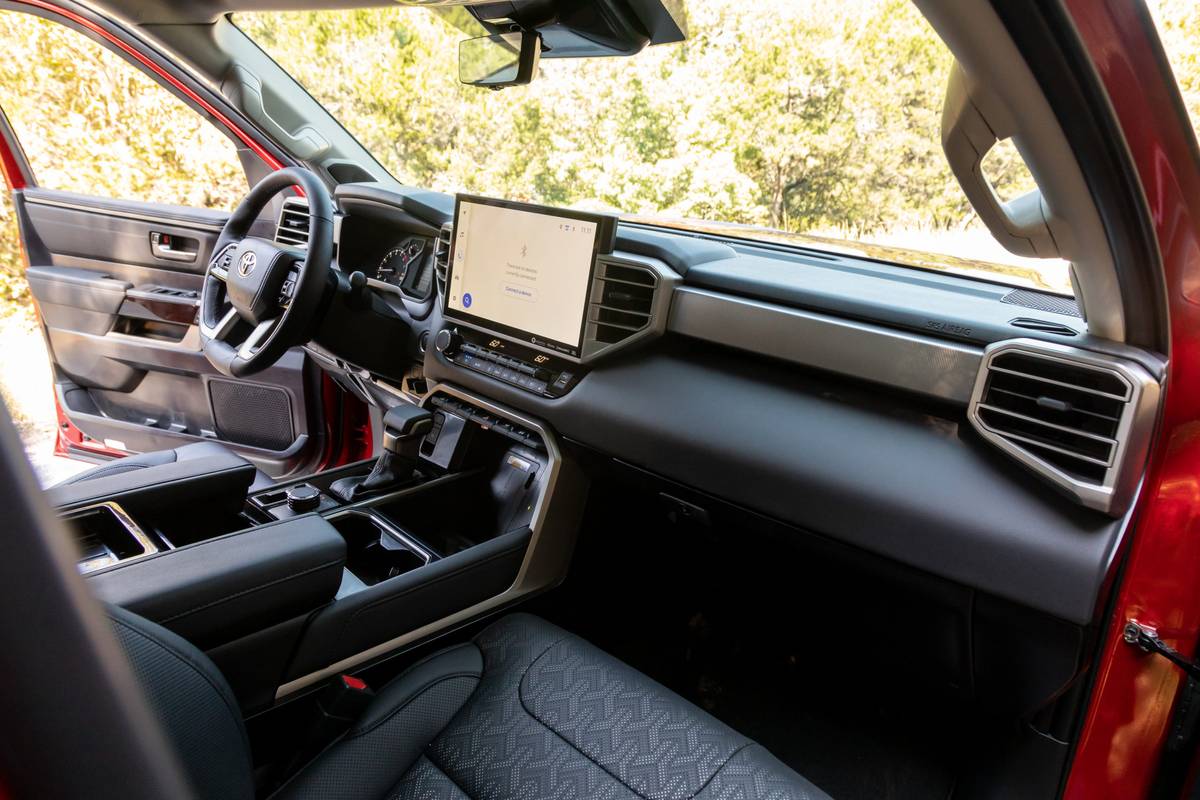
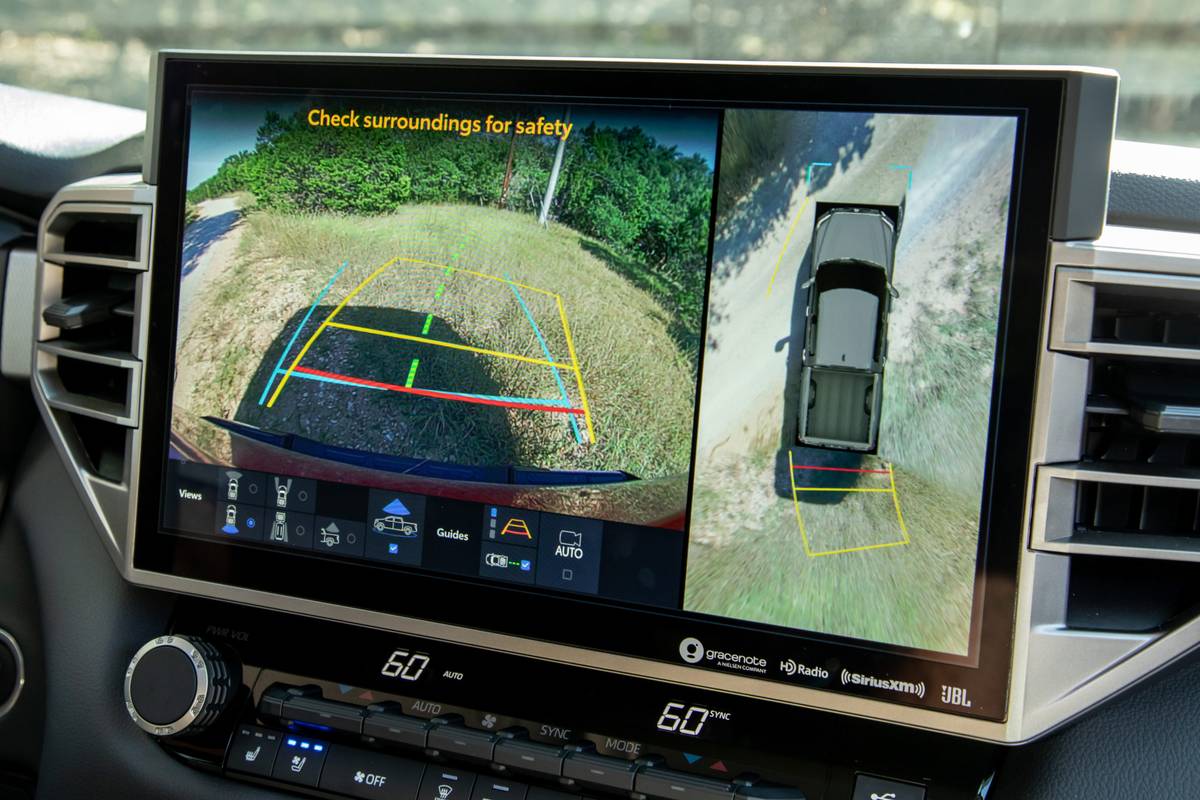
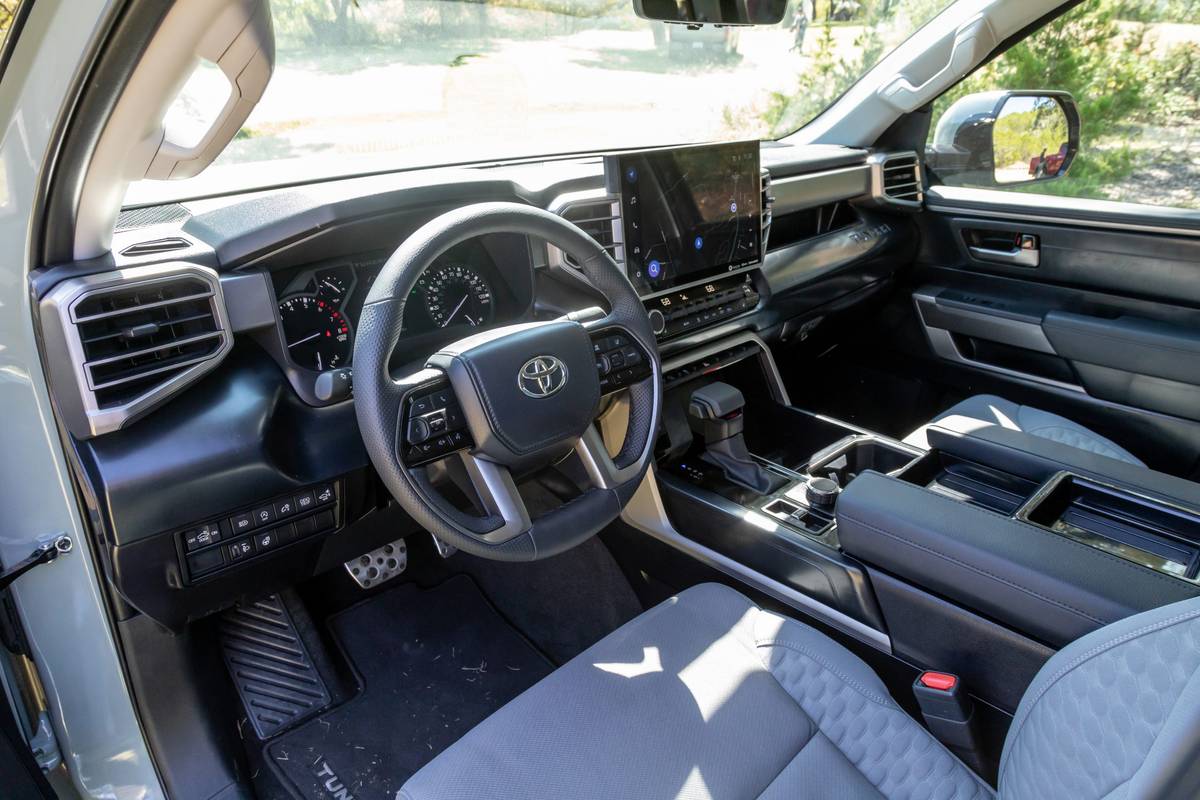
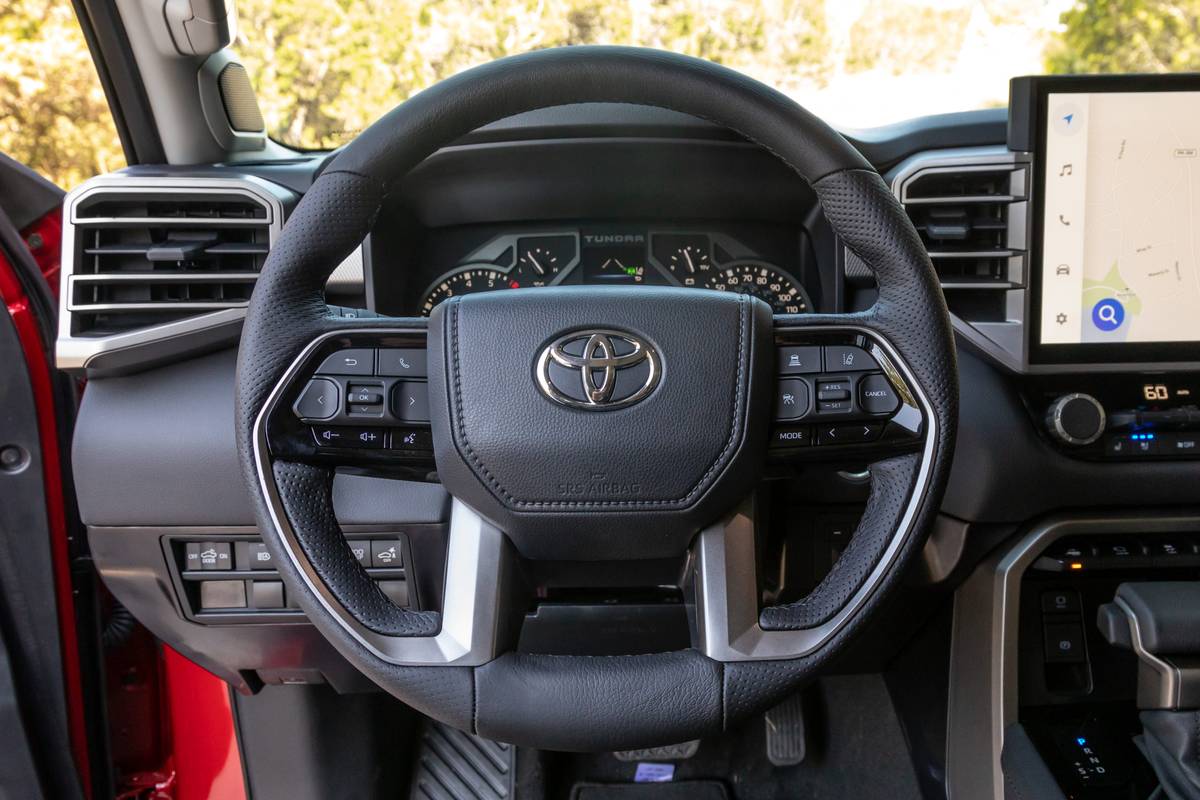
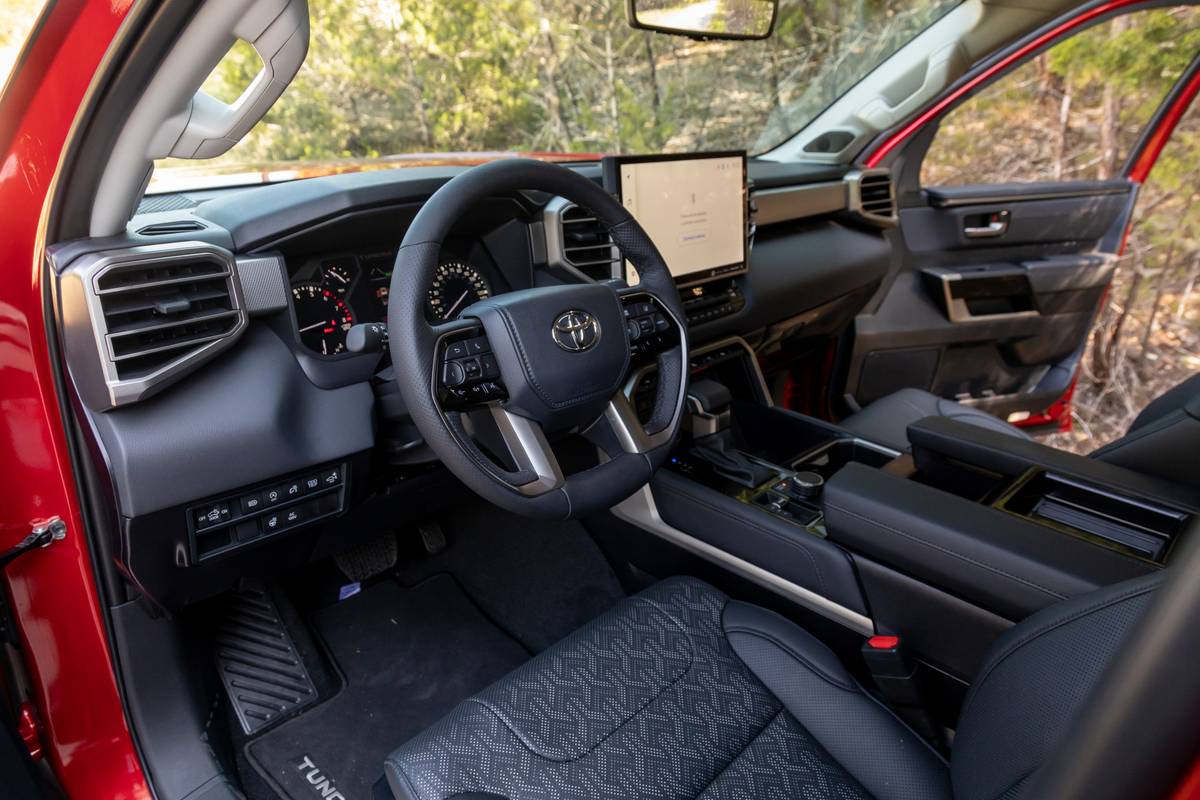
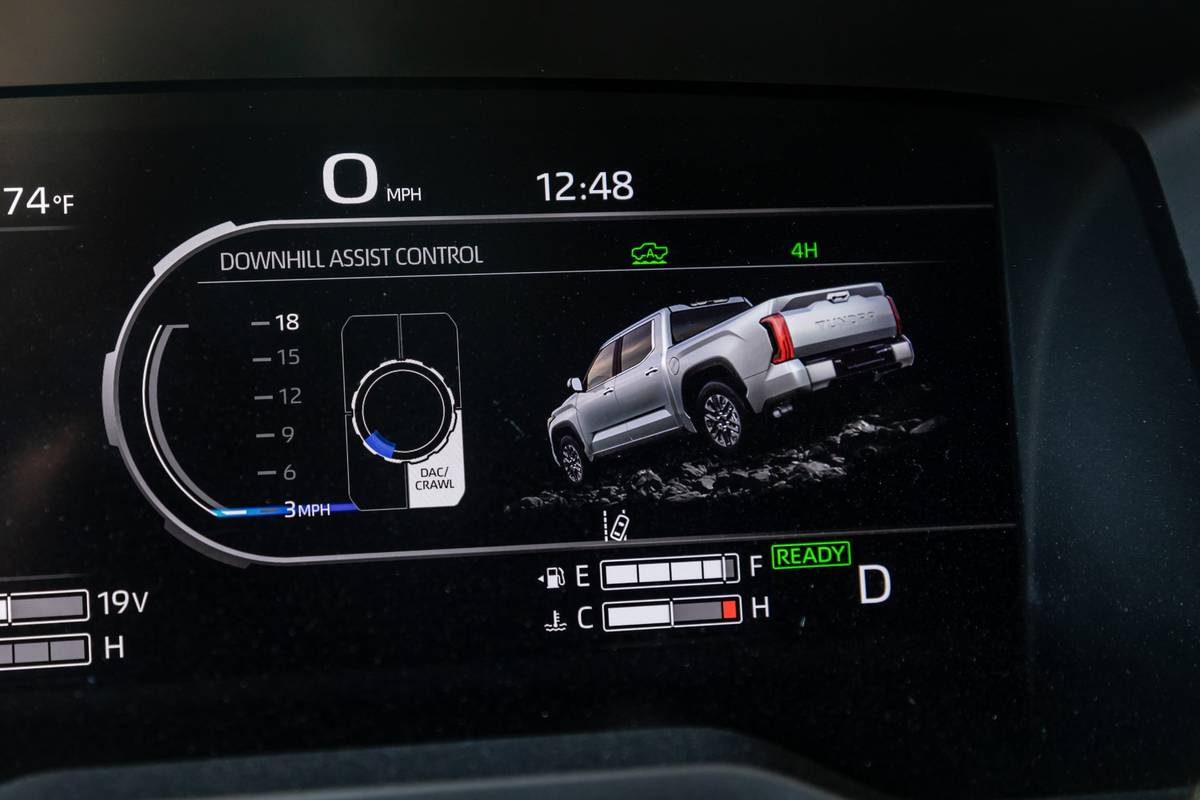
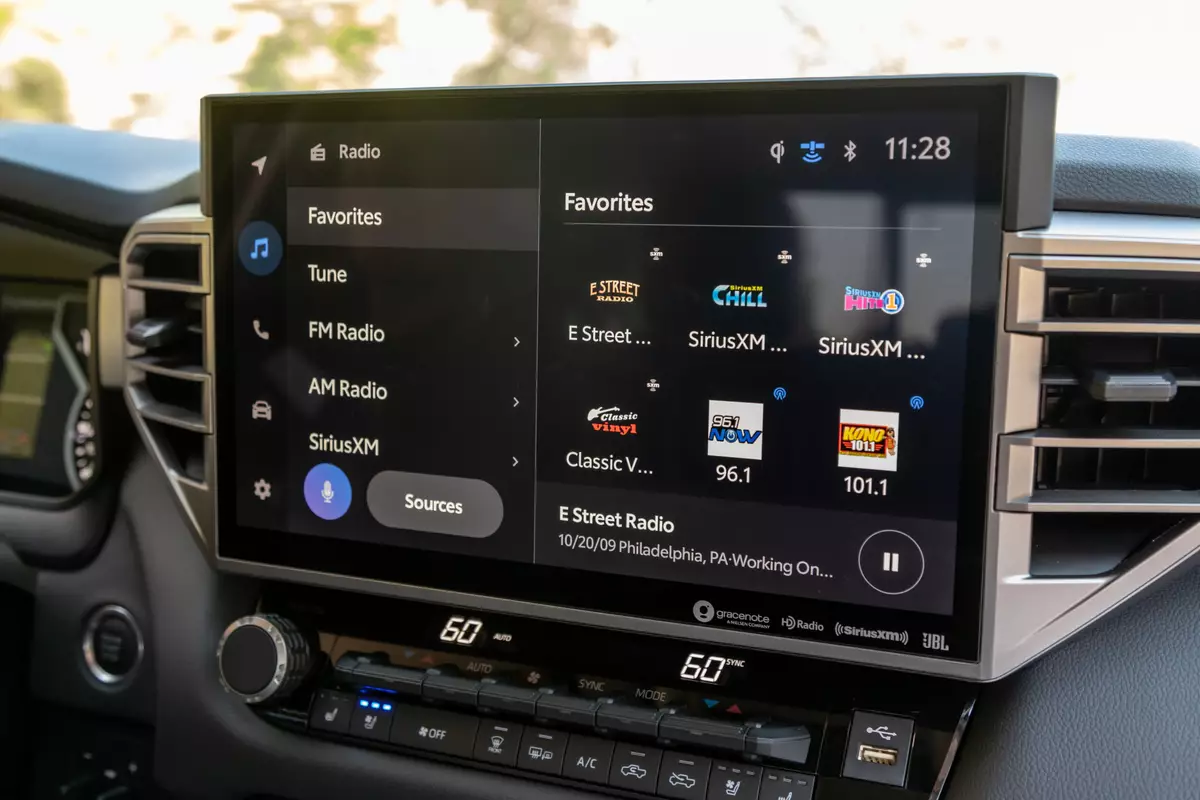
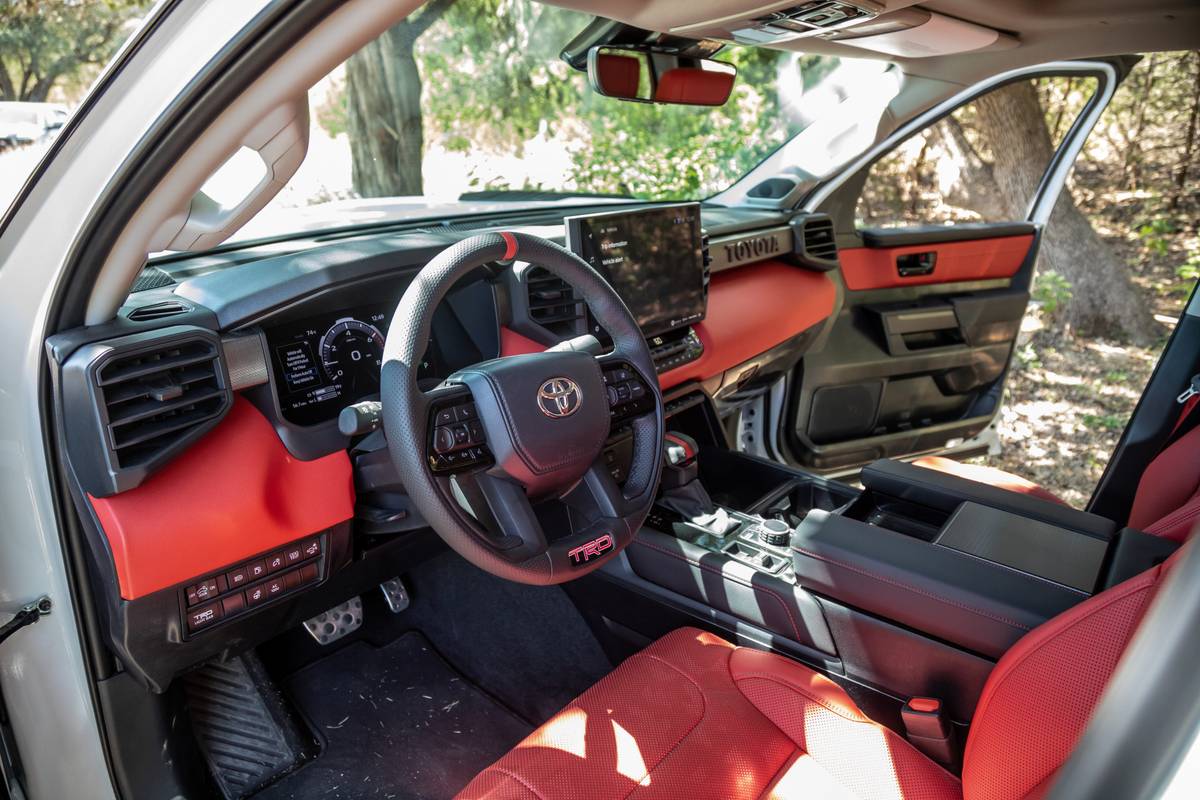
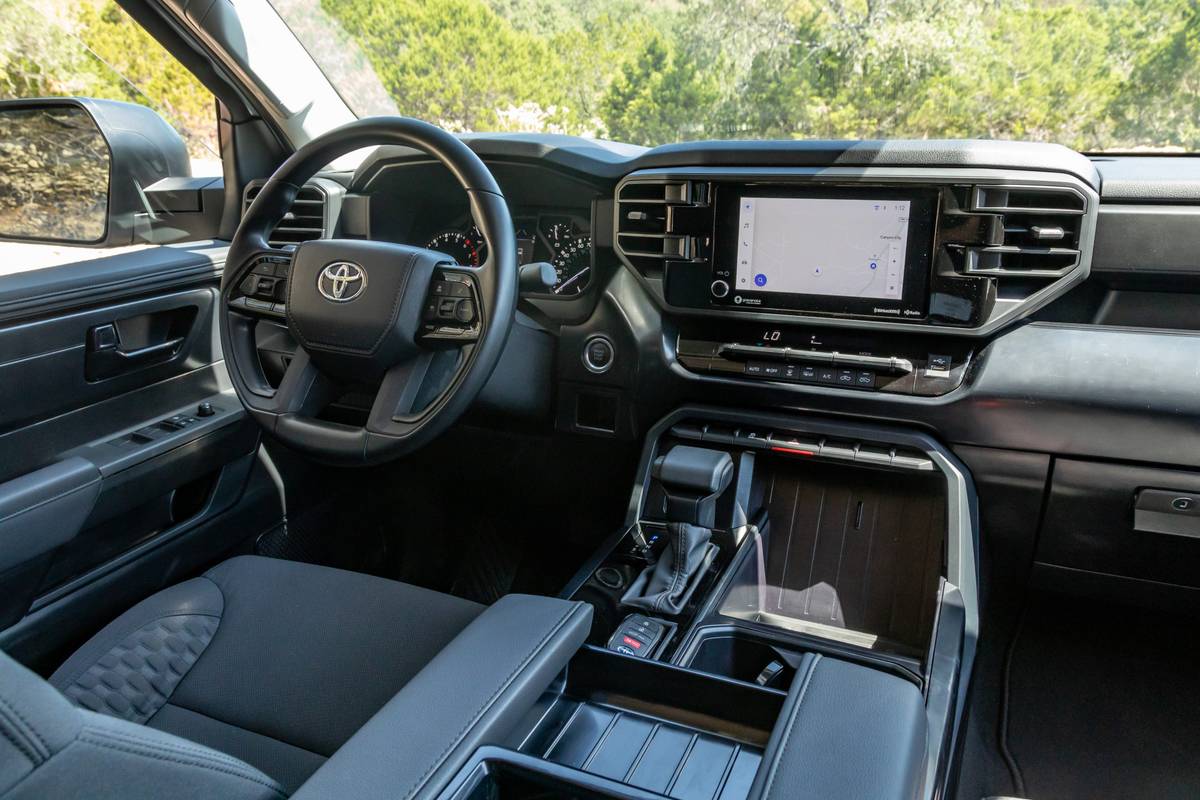
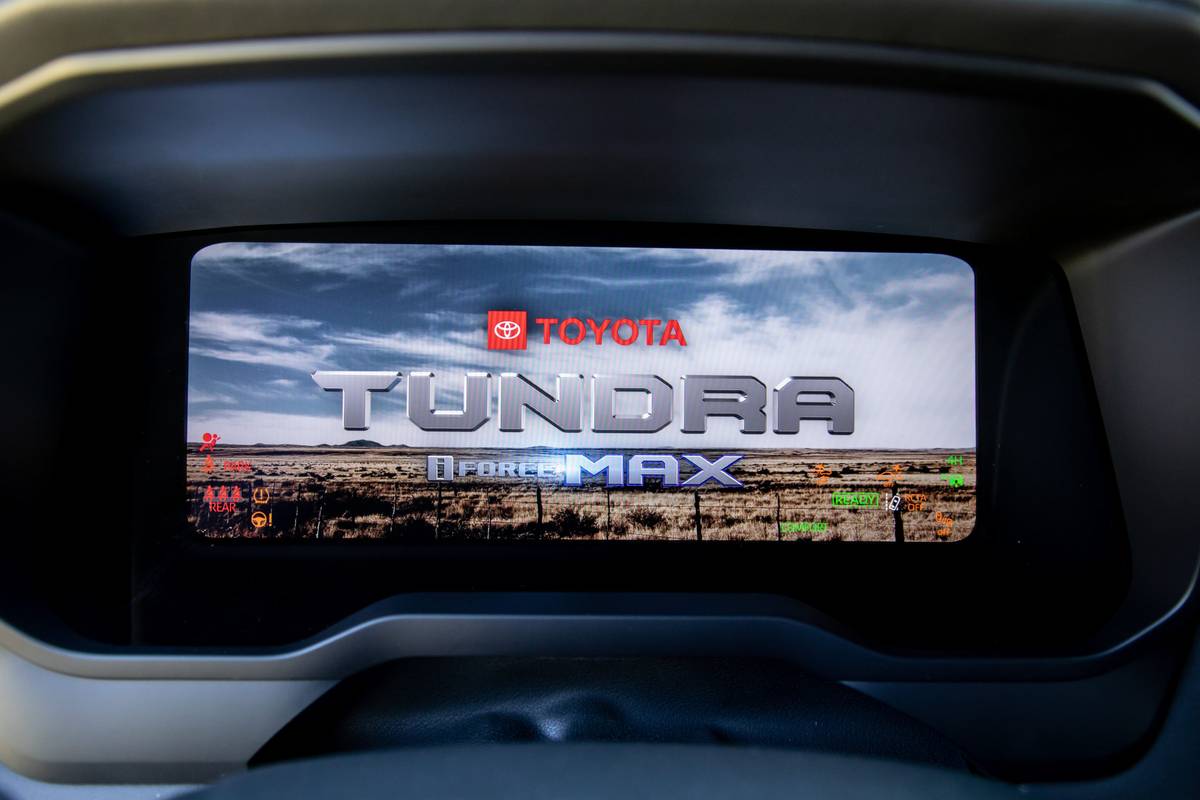

















The Interior
Toyota did away with the Tundra’s high-shelf dashboard for something with a few graduated layers, plus an 8- or 14-inch touchscreen that juts a little bit above it all. (The outgoing Tundra had a 7- or 8-inch touchscreen, depending on trim.) Both screens use Toyota’s new Audio Multimedia system, a version of which we first saw in the redesigned NX from Toyota’s Lexus division. It’s a straightforward unit with oversized icons, simple menu structures and a purported five times faster processing regardless of screen size. Wireless integration of Apple CarPlay and Android Auto is standard, and CarPlay works over the entire display — a problem with some of Toyota’s other oversized screens, which confine phone projection to a subset of the screen.
The dashboard controls are intuitive overall, with toggle switches for the air conditioning, an oversized volume knob with the 14-inch touchscreen and mercifully few operations buried in the submenus. Annoyingly, the 8-inch screen swaps the large volume knob for a tiny one that could evade operation with work gloves, and that’s in the trim levels likeliest to end up with contractors. Neither screen offers a tuning knob, and the rickety gear selector is like so many others from Toyota.
Cabin quality is otherwise fine, with soft-touch surfaces in areas your arms and knees touch. No trim level can match the leather-lined extravagance of a top-flight Ram 1500, a pickup so premium we named it our top luxury vehicle in 2020, but materials are class-competitive otherwise. Lower trim levels cheap out a bit, swapping in hard-touch plastics on the console sides and rear doors, but that’s to be expected among full-size trucks. The redesigned console limits knee width a tad more than in the prior generation, but the berth should still be wide enough for larger drivers; ditto for the Tundra’s wide, flat seats. Backseat knee clearance is workable in the Double Cab and generous in the CrewMax, with good headroom and cushion height regardless.
Cabin storage abounds, with console cubbies aplenty and, in most trim levels, storage bins under the pop-up rear seat cushions. Above them, the head restraints tip forward to improve visibility out back, with a camera-based rearview mirror on top trim levels to clear it up further. Still, the Tundra’s chunky B-pillars hamper visibility over your left shoulder regardless of cab style. Most trims offer a blind spot warning system, but no electronics can replace inherently good sight lines.
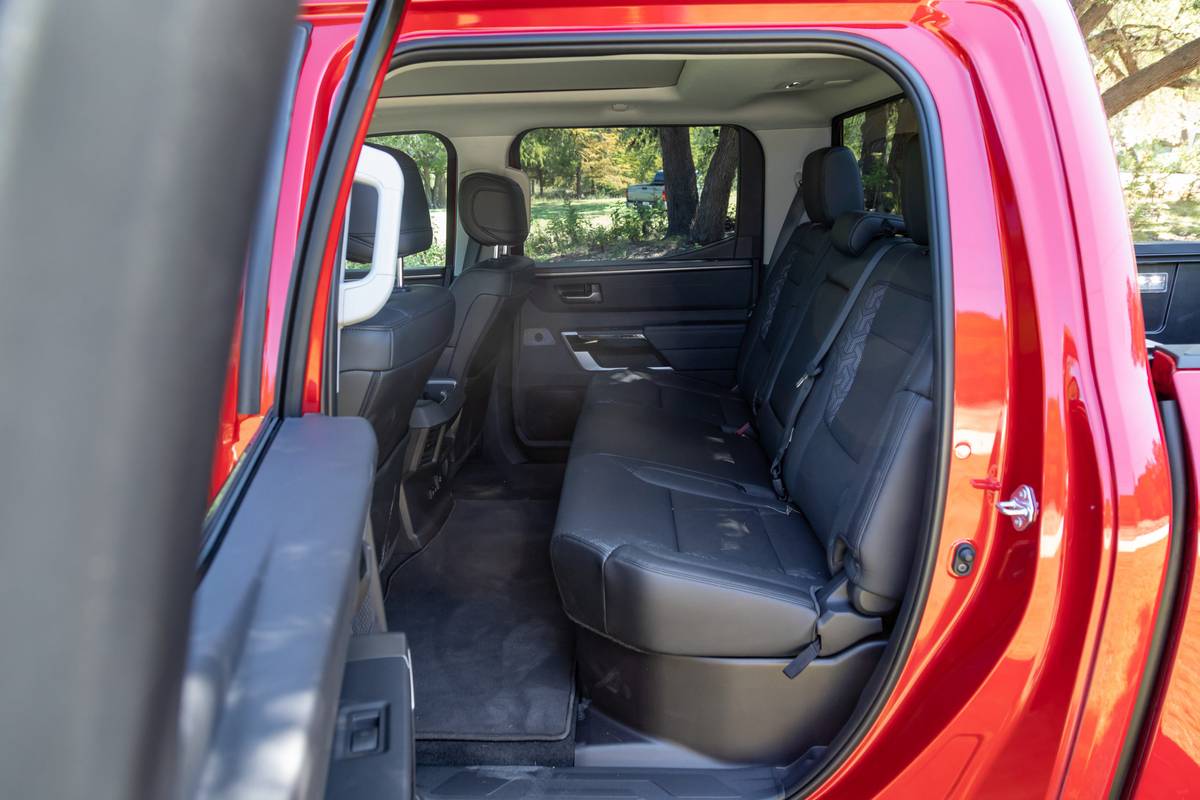
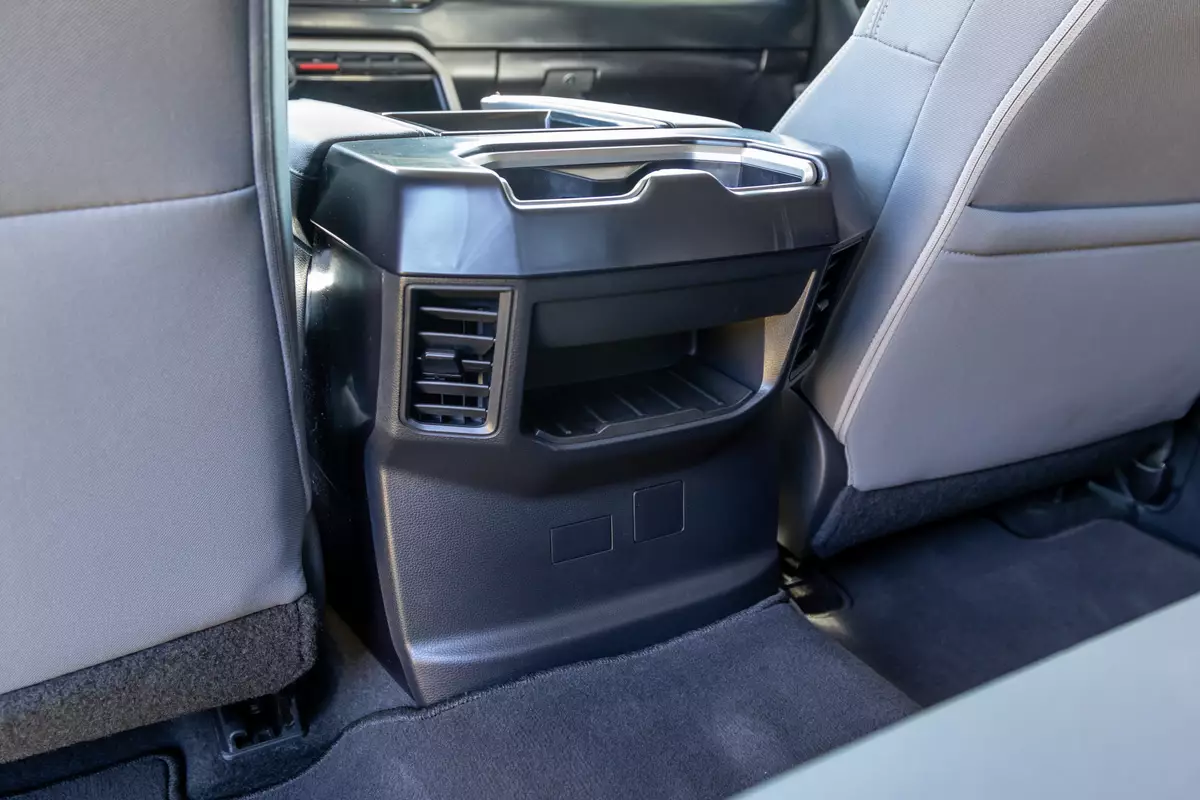
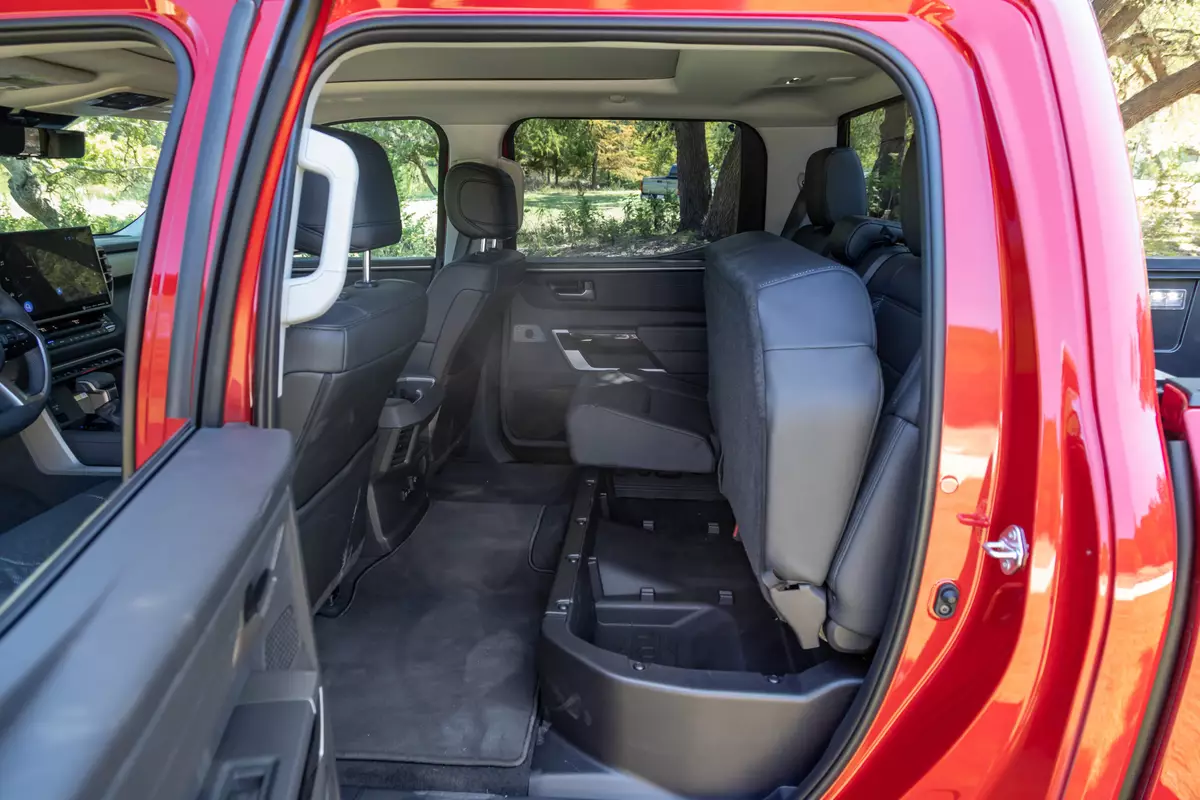
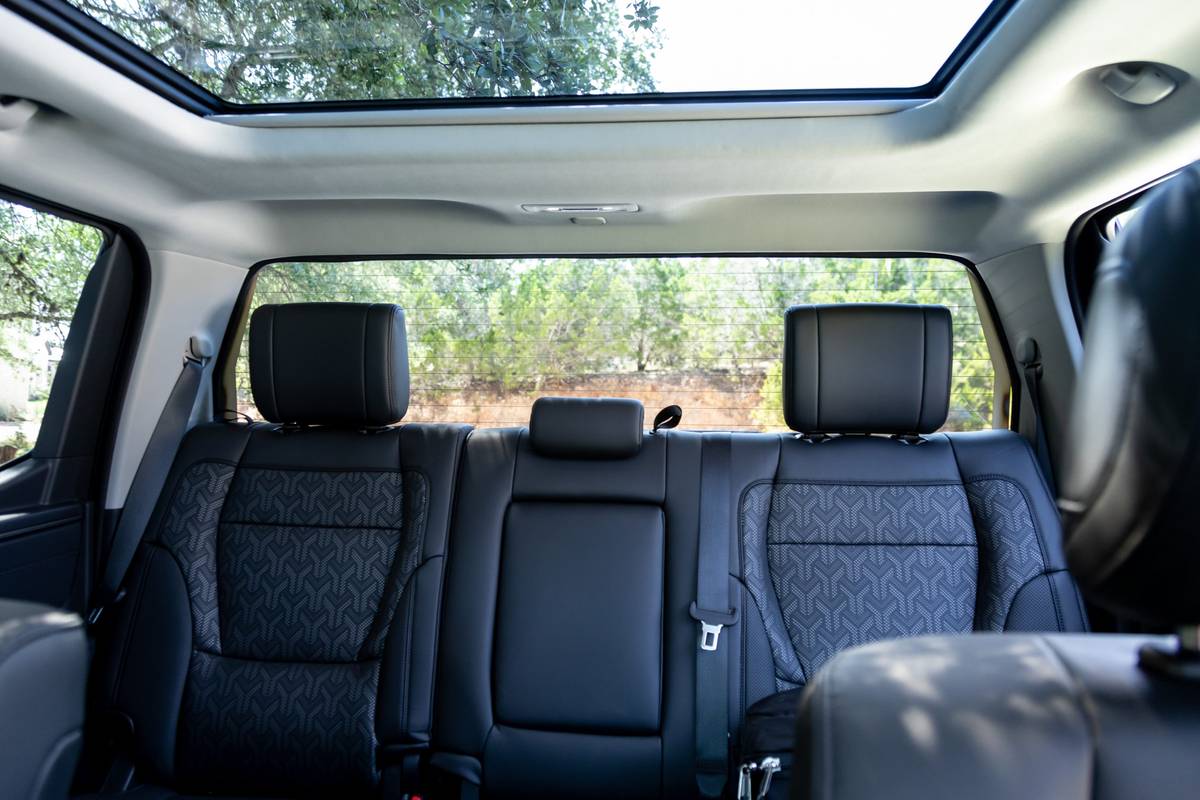
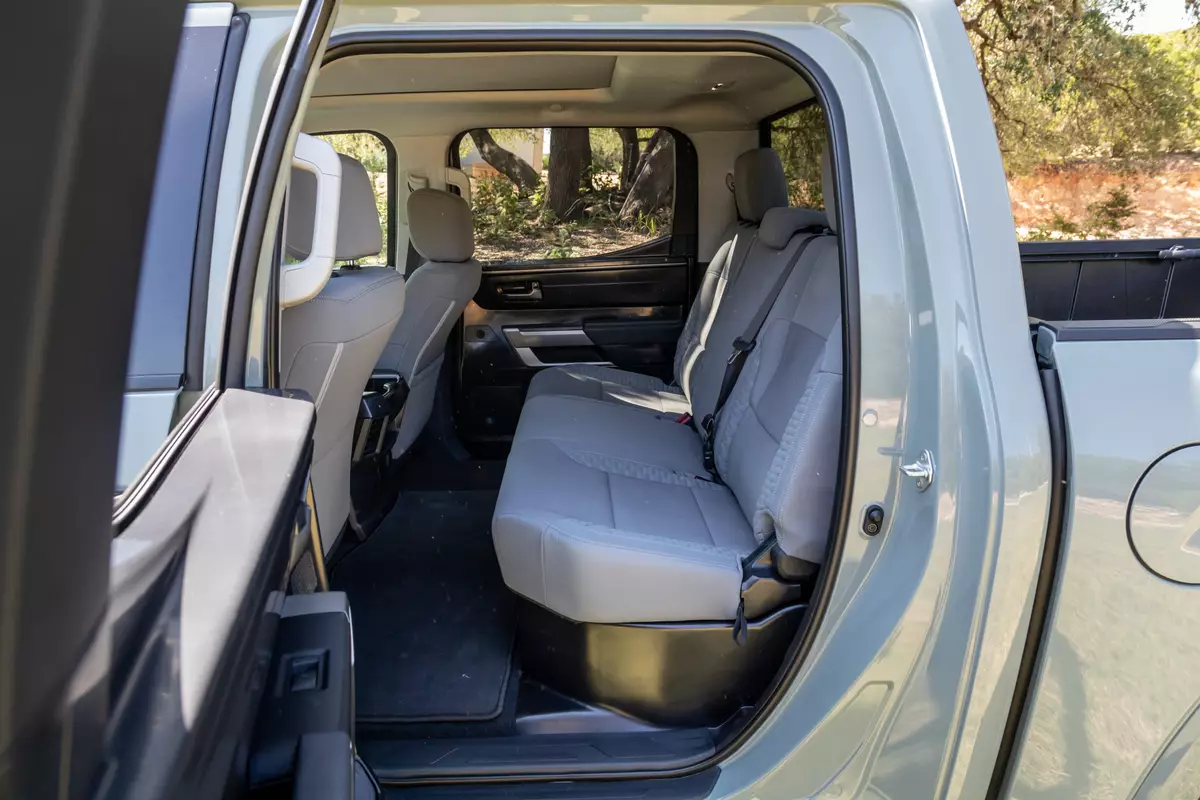
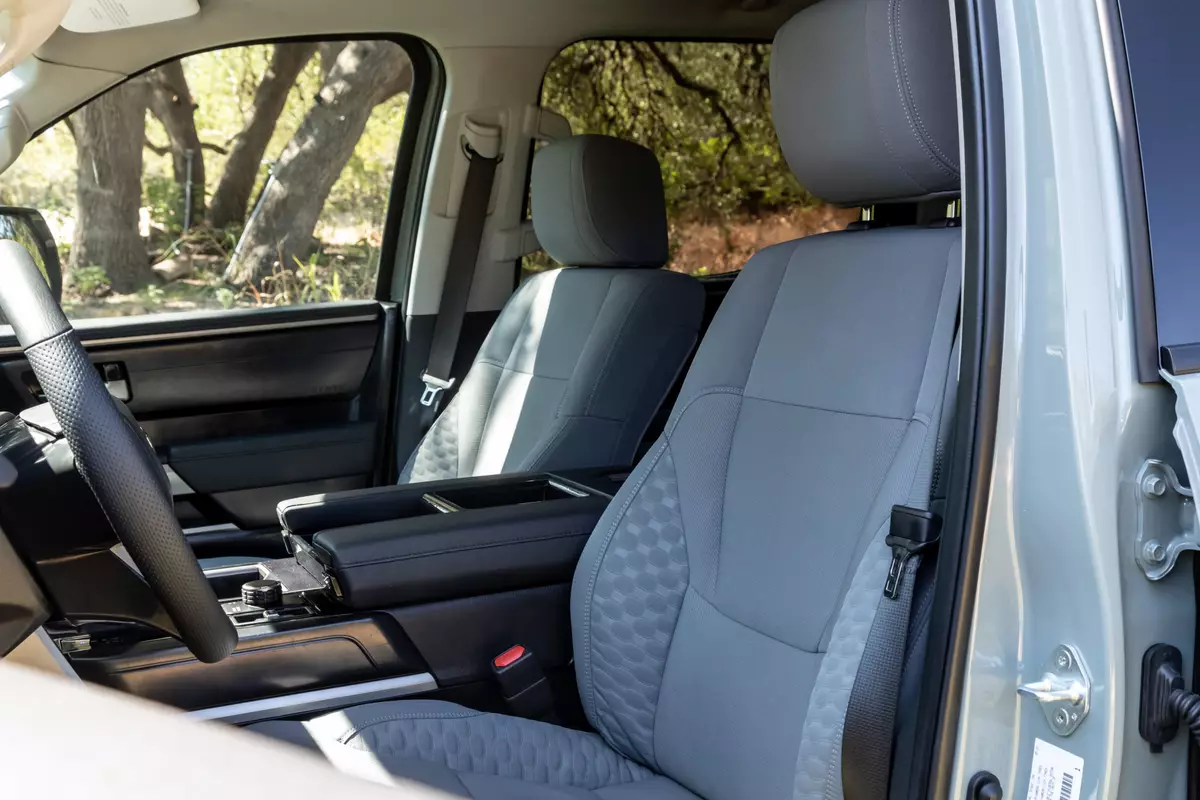
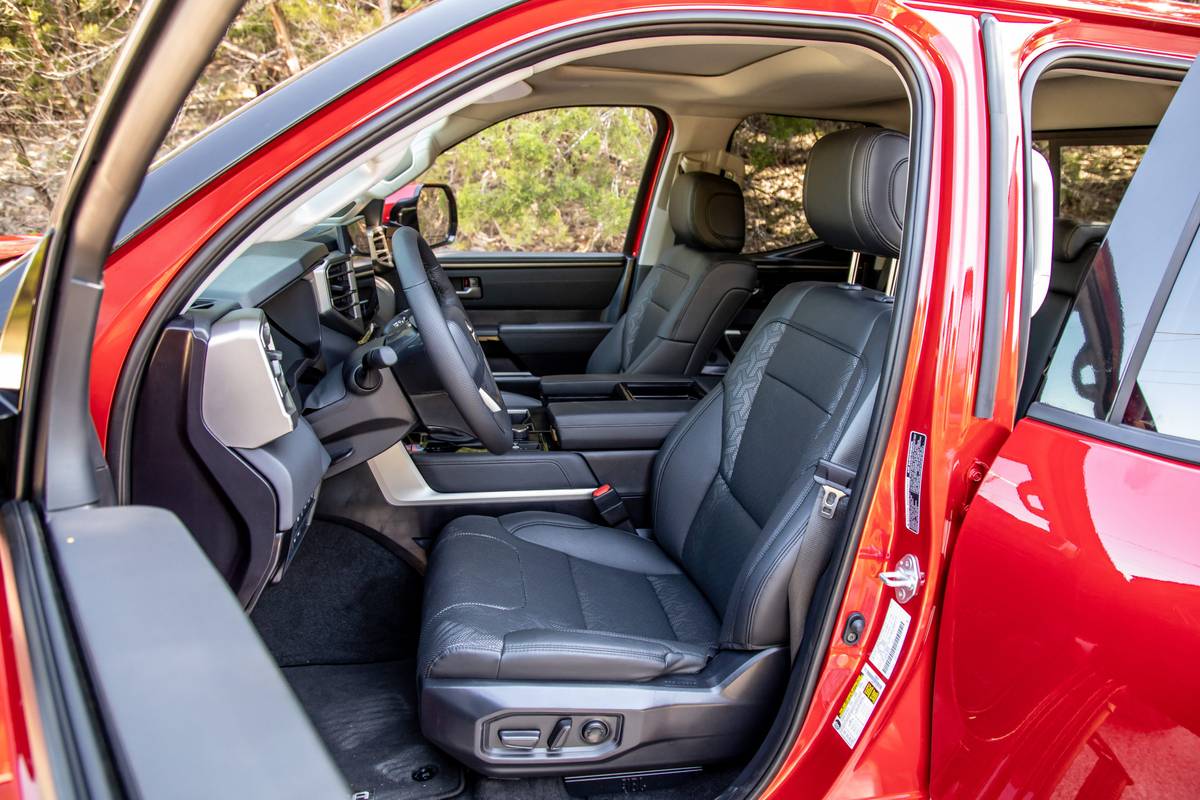
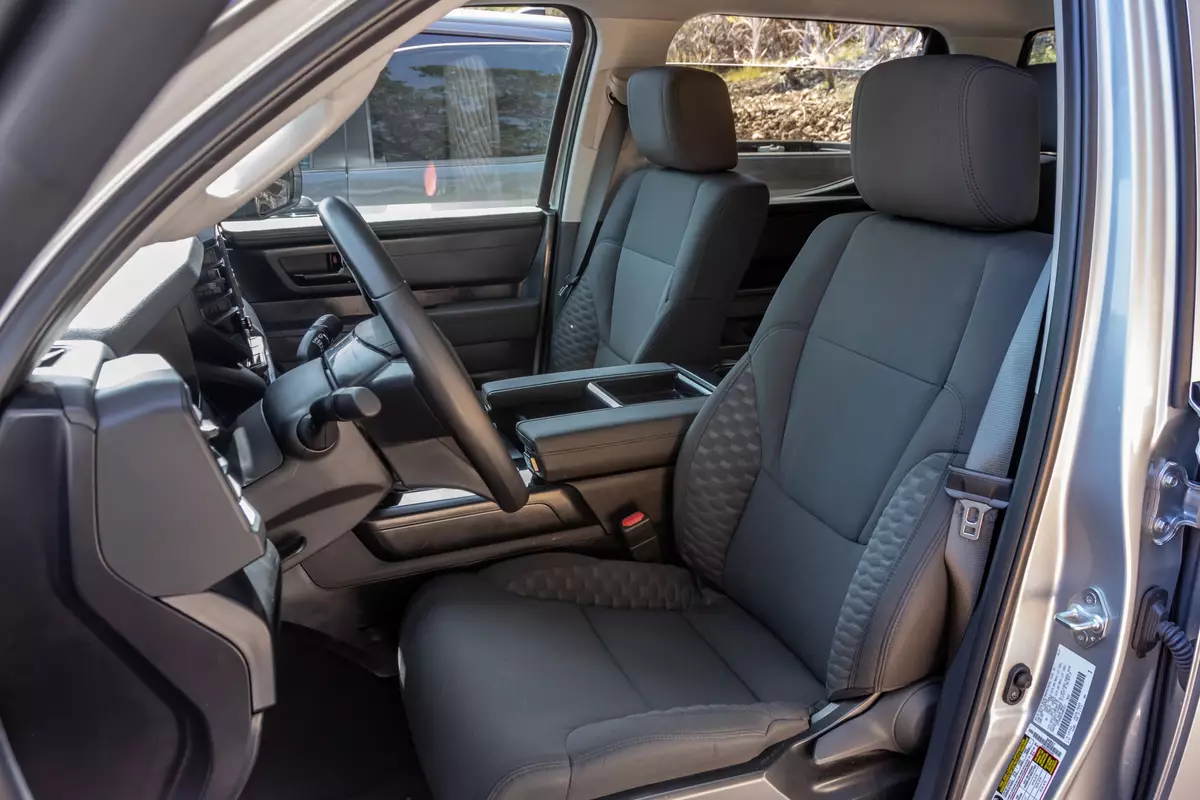
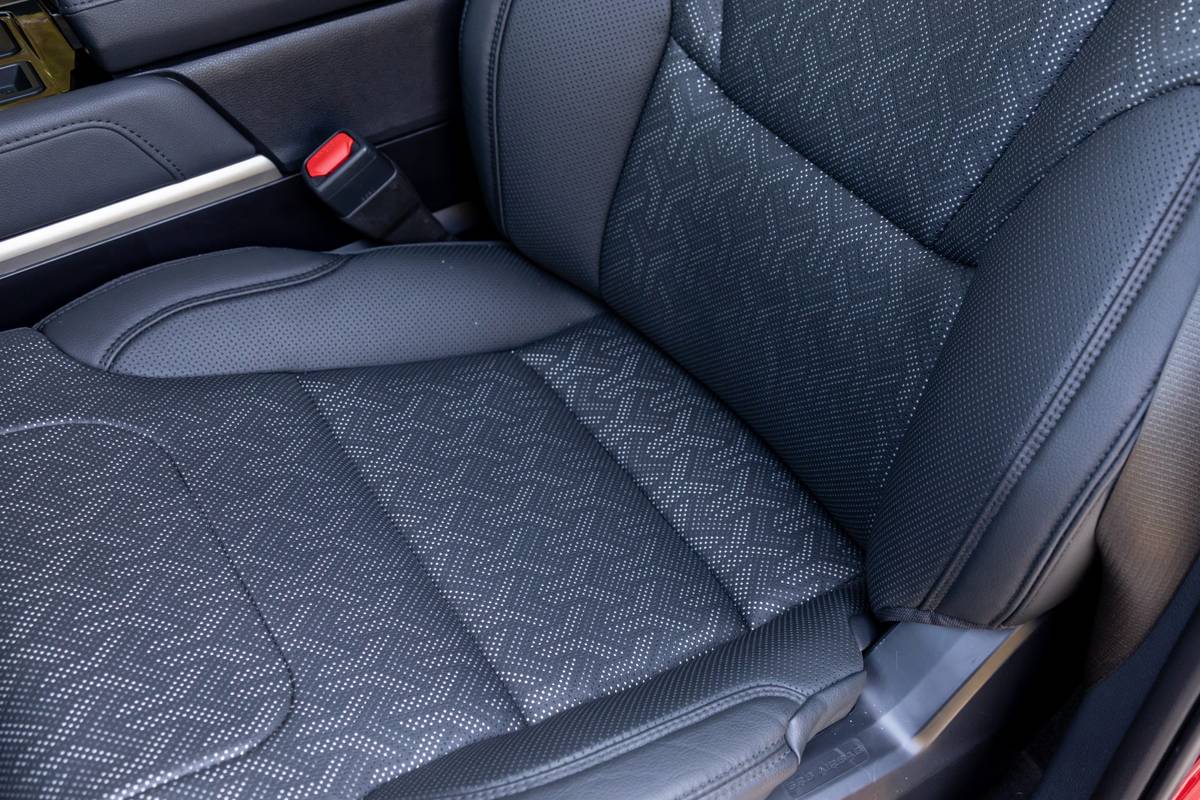
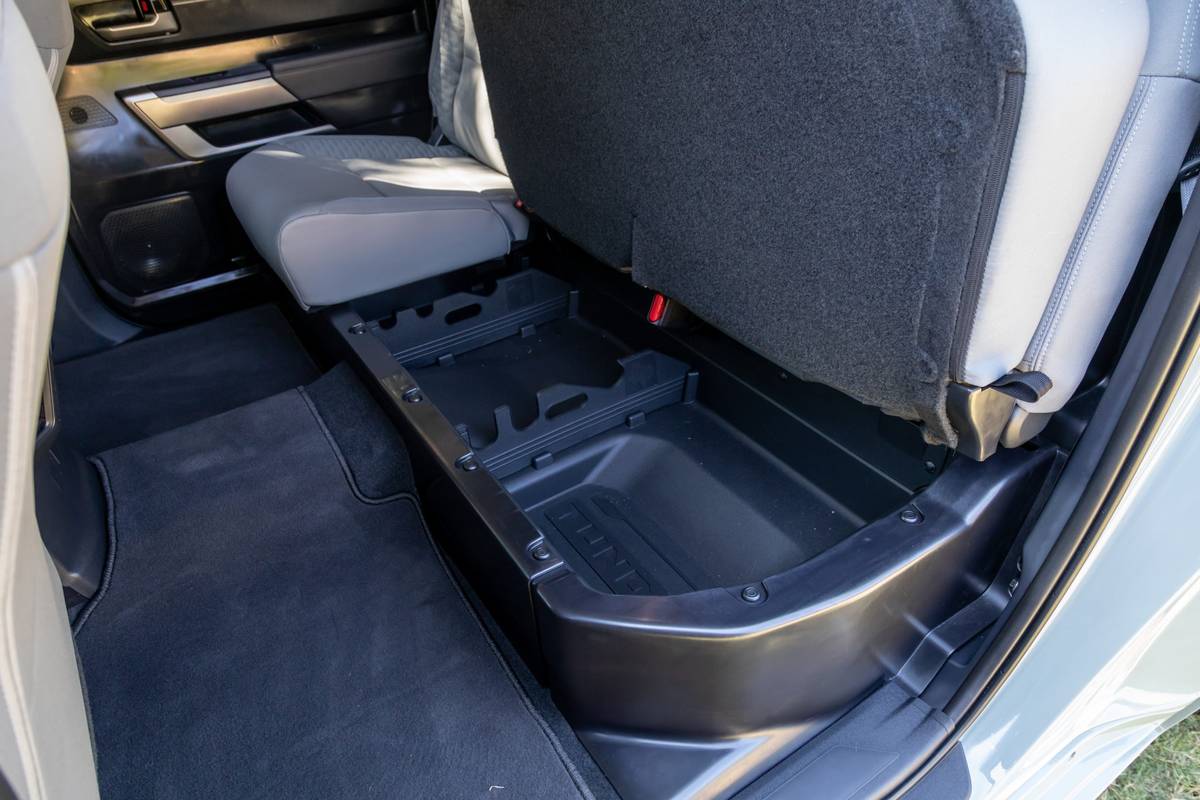










Safety, Driver-Assist and Other Features
The prior generation’s spotty crash-test scores from the Insurance Institute for Highway Safety don’t carry over to the redesigned 2022 model, but the agency has yet to publish anything more recent. Standard features include automatic emergency braking with pedestrian detection, plus lane departure warning with steering assist. Impressively, adaptive cruise control and hands-on lane centering, two features typically optional among half-ton pickup trucks, are standard here.
Pricing and EPA mileage remain unavailable as of this writing, but standard features are impressive. Among them are the aforementioned safety and driver-assist tech, plus the 8-inch touchscreen with wireless Apple CarPlay and Android Auto, three USB ports, one-touch power windows all around, single-zone automatic climate control and keyless access with push-button start. One curious omission is a height-adjustable driver’s seat, missing in the SR and standard SR5 grades. Absent the adjuster, some drivers may find the chair too low.
Power front seats with dual height adjusters are optional, as are dual-zone climate controls, vinyl or leather upholstery with heating and ventilation for both rows, regular or panoramic moonroofs, and a heated steering wheel with power tilt/telescoping adjustments. Optional on the SR5 and standard higher up is the 14-inch touchscreen; other tech extras include 12.3-inch virtual gauges, a 360-degree camera system, a head-up display, wireless phone charging and two more USB ports.
Related Video:
Should You Buy a Tundra?
Redesigned pickup trucks often see automakers throwing everything at the wall to see what sticks. Styling notwithstanding, Toyota played it a bit safe. The Tundra offers no hands-free steering, a feature soon available on the F-150 and GM’s updated trucks. You don’t get a host of new bed features, nor towing or payload packages that outspec a few competitors. The Tundra hybrid is a feat, but Ford beat Toyota to the punch on that. And the 10-speed with either powertrain I tested needs grooming.
But the Tundra is a strong choice for the heart of the half-ton market: crew-cab shoppers who want a truck in the $40,000 to $50,000 range. The effort here is clear, with few moon shots but many concrete gains. I’m not sure the one emphasis precluded the other, but there’s only so much investment a redesign can get. For most truck shoppers, I suspect the Tundra got plenty.
Editor’s note: This story was updated Nov. 5, 2021, to clarify that the base SR trim has a detuned version of the V-6 engine. It was updated further on Nov. 10, 2021, to clarify the previous generation’s timespan. A third update on Jan. 11, 2022, added information on the Capstone trim level.
Cars.com’s Editorial department is your source for automotive news and reviews. In line with Cars.com’s long-standing ethics policy, editors and reviewers don’t accept gifts or free trips from automakers. The Editorial department is independent of Cars.com’s advertising, sales and sponsored content departments.

Former Assistant Managing Editor-News Kelsey Mays likes quality, reliability, safety and practicality. But he also likes a fair price.
Latest news
